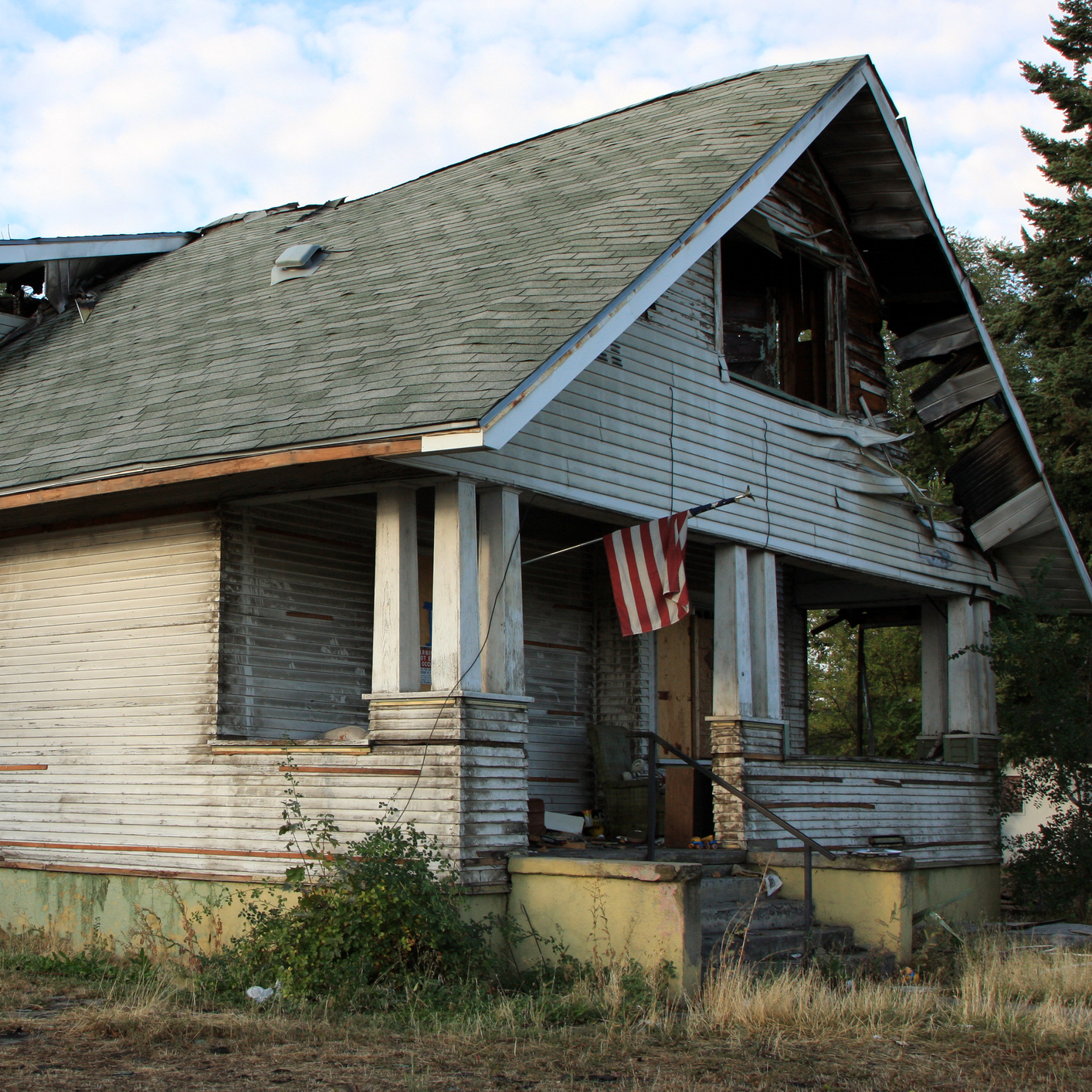
In the wake of the ongoing housing recovery, a new problem has arisen: a shortage of homes for sale. But while this might be the problem in most of the country’s stable housing markets, some neighborhoods and cities suffer from a completely different problem: too many vacant homes.
There are nearly 1.4 million vacant residential properties across the country — abandoned, not for sale, mostly unoccupied homes. With vacant properties comprising as much as 30% of residential properties, some neighborhoods are starting to feel like ghost towns.
24/7 Wall St. reviewed the 30 highest vacancy rates in U.S. ZIP codes from housing market data company Attom Data Solutions. These 30 neighborhoods are contained within 20 metropolitan areas. Many have not participated in the nation’s economic recovery — areas that continue to experience the economic malaise of the Great Recession. They are characterized by shrinking populations, jobs loss, low home values, and underwater mortgages.
In an email to 24/7 Wall St., Attom senior vice president Daren Blomquist noted that to reach vacancy rates of 20% to 30%, an area usually needs to have endured long periods of poor economic conditions that lead to population decline.
Click here to see America’s 30 ghost towns.
Click here to see our detailed findings and methodology.
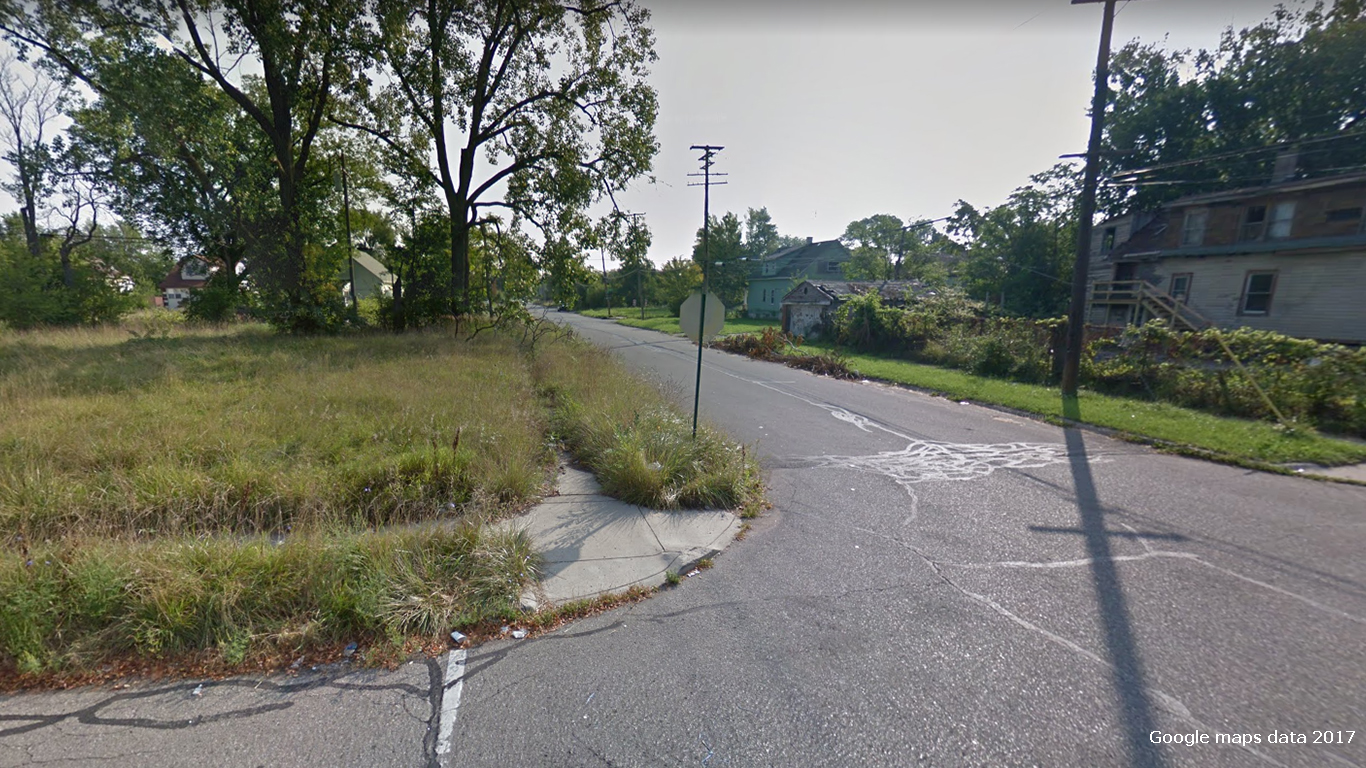
30. ZIP 48203 (Highland Park, Michigan)
> Vacant properties: 1,832 (16.9%)
> 5 yr. population change: -15.7%
> Population: 25,027
> Median home value: $38,900
Many of the U.S. postal codes with the highest vacancy rates are located within the Detroit metro area — and the 48203 ZIP code, which includes Highland Park, is one of them. Encircled by the city of Detroit, Highland Park fell victim to the same post-industrial economic forces that hurt neighborhoods throughout the Motor City in the latter half of the 20th century. As the American auto manufacturing industry declined, so did Highland Park’s population. Peaking at 53,000 residents in 1930, when Chrysler still had its headquarters in the city, Highland Park has since lost over 40,000 residents in addition to losing the Chrysler headquarters. Declining populations mean lower demand for housing, and an estimated 16.9% of homes in the broader 48203 ZIP code are currently vacant.
[in-text-ad]
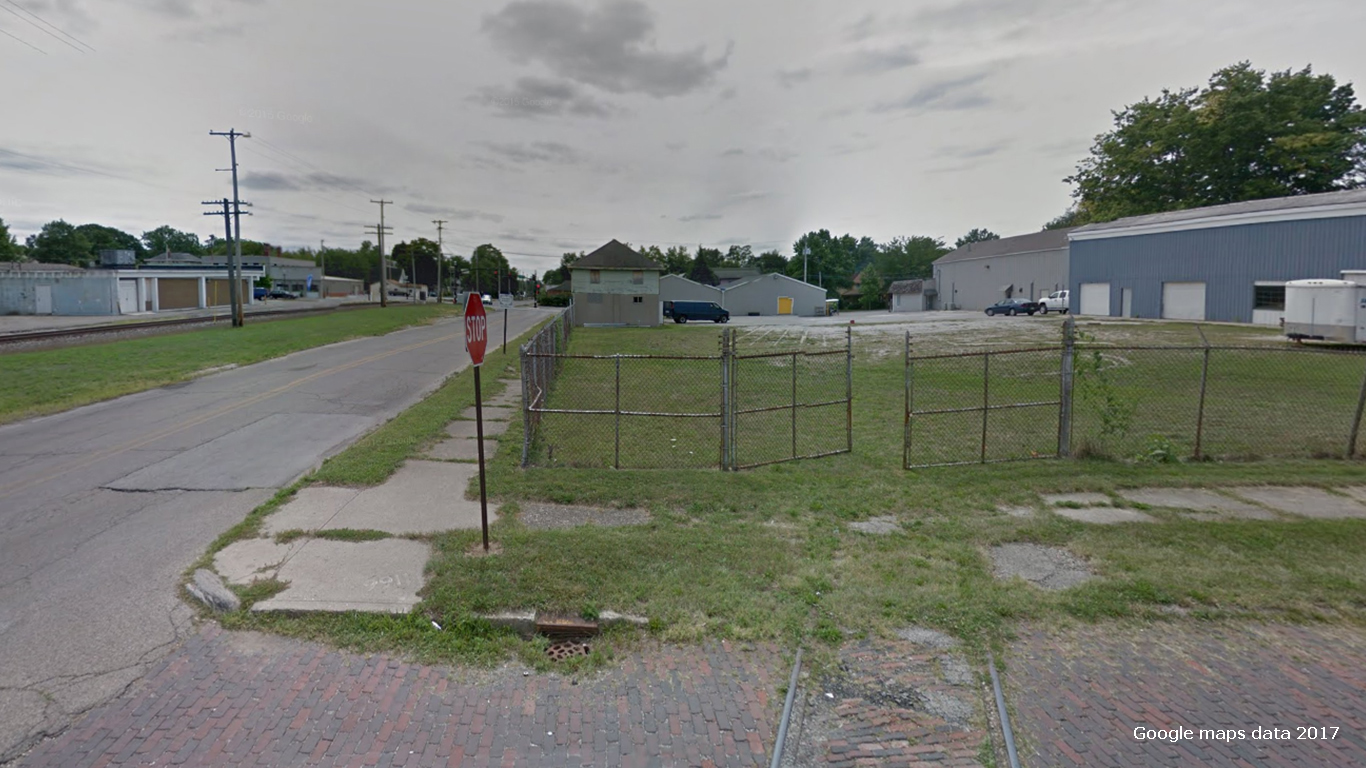
29. ZIP 46016 (Anderson, Indiana)
> Vacant properties: 1,180 (17.0%)
> 5 yr. population change: 0.1%
> Population: 18,221
> Median home value: $40,100
Anderson, Indiana is one of many cities on this list decimated by the decline of the American auto industry. In the early 1970s, roughly one-third of the population worked at one of several General Motors plants located within the city. Now, over four decades later, GM no longer has a presence in the town, having sold or shut down all of its manufacturing plants in Anderson. The city’s 46016 ZIP code, situated along the south shore of the White River, has one of the highest vacancy rates in the country. An estimated 17.0% of houses within the ZIP code have been abandoned and remain vacant.
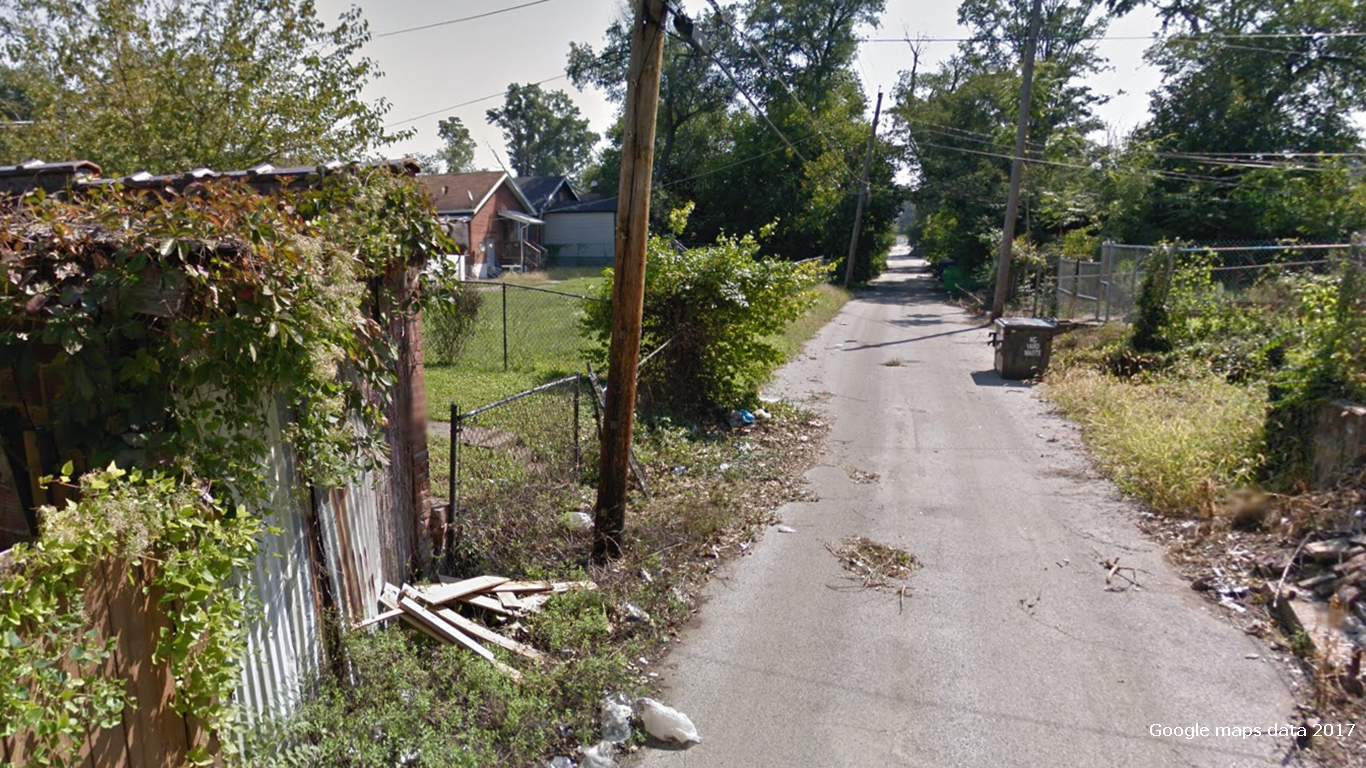
28. ZIP 63113 (St. Louis, Missouri)
> Vacant properties: 820 (17.1%)
> 5 yr. population change: -5.1%
> Population: 12,113
> Median home value: $65,600
Currently home to just over 311,000 people, St. Louis has been in a downward spiral since its population peaked at 857,000 in 1950. The city’s 63113 ZIP code has been hit especially hard in recent years. In the past half decade, the area lost 5.1% of its population. Many leaving the area recently likely abandoned their residences as some 17.1% of area homes are vacant.
As is the case in much of the country, real estate investors are taking advantage of abandoned properties in the 63113 ZIP code. An estimated 89.1% of abandoned homes are currently owned by investors, well above the comparable share nationwide of 75.5%.
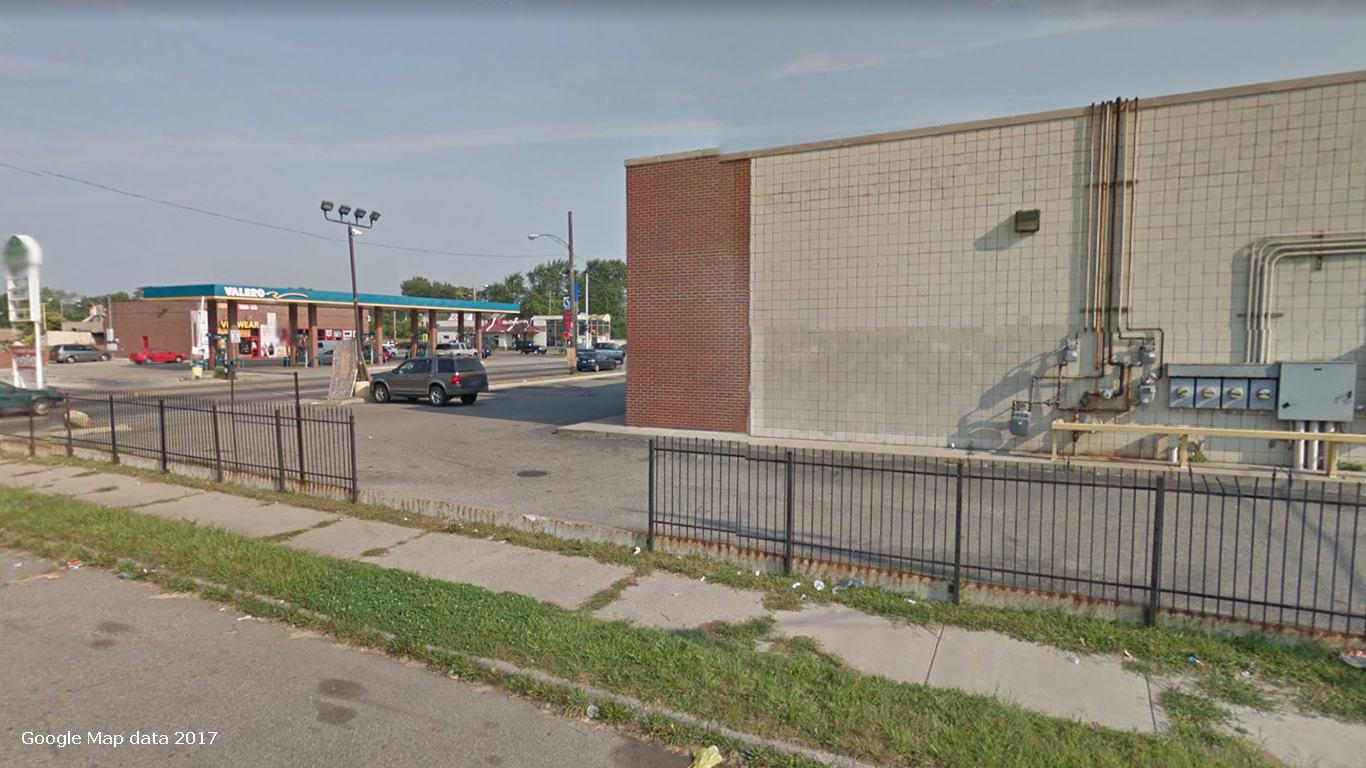
27. ZIP 48238 (Detroit, Michigan)
> Vacant properties: 2,102 (17.1%)
> 5 yr. population change: -12.5%
> Population: 29,865
> Median home value: $41,600
Detroit is the quintessential American Rust Belt city. As the American auto manufacturing sector declined in the latter half of the 20th century, Detroit’s population fell rapidly, from a high of 1.8 million people in 1950 to only 673,000 in 2016. Some of that decline occurred in Detroit’s 48238 ZIP code. In the last five years, the area’s population contracted by 12.5%. Today, the 48238 ZIP code is one of four within the city where over 17% of all homes are vacant.
The rapid population decline and high vacancy rate have likely played a role in the area’s depressed housing market. The typical home in the 48238 ZIP code is worth only $41,600 — a fraction of the median home value nationwide of $178,600.
[in-text-ad-2]
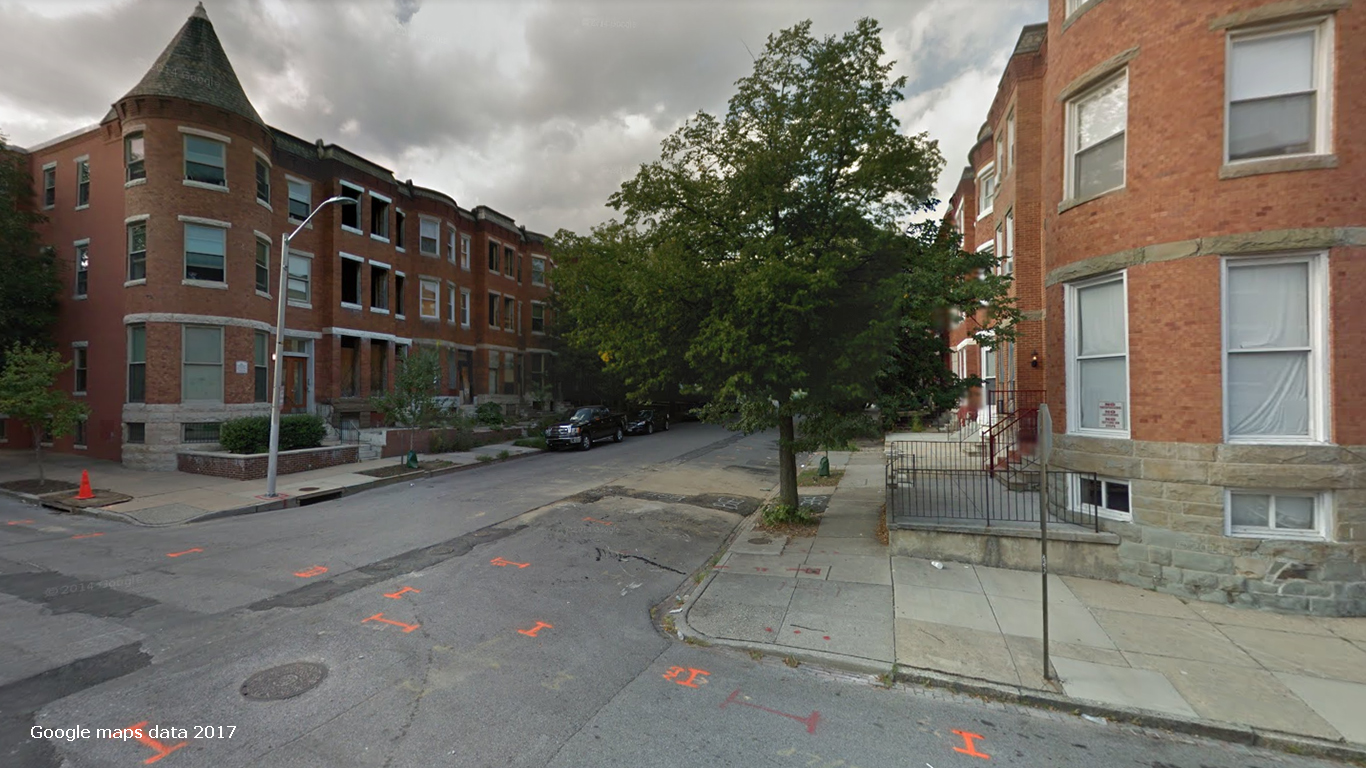
26. ZIP 21223 (Baltimore, Maryland)
> Vacant properties: 2,205 (17.3%)
> 5 yr. population change: -3.5%
> Population: 24,904
> Median home value: $71,000
Some 17.3% of homes in Baltimore’s 21223 ZIP code — which includes the Lexington, Mt. Clare, and Shipley Hill neighborhoods — are vacant. Few socioeconomic factors can drive residents away and depress property values like a high violent crime rate. There were 710 violent crimes for every 100,000 Baltimore metro area residents in 2016 — well above the U.S. violent crime rate of 386 incidents for every 100,000 people.
The area’s high violent crime rate may also be scaring away real estate investment. Nationwide, 75.5% of vacant properties are owned by an investor, and in most ZIP codes with the highest vacancy rates, the share of investor-owned vacant properties is far higher. Baltimore’s 21223 ZIP code is an exception, however, as investors have bought up only about 71% of vacant homes.
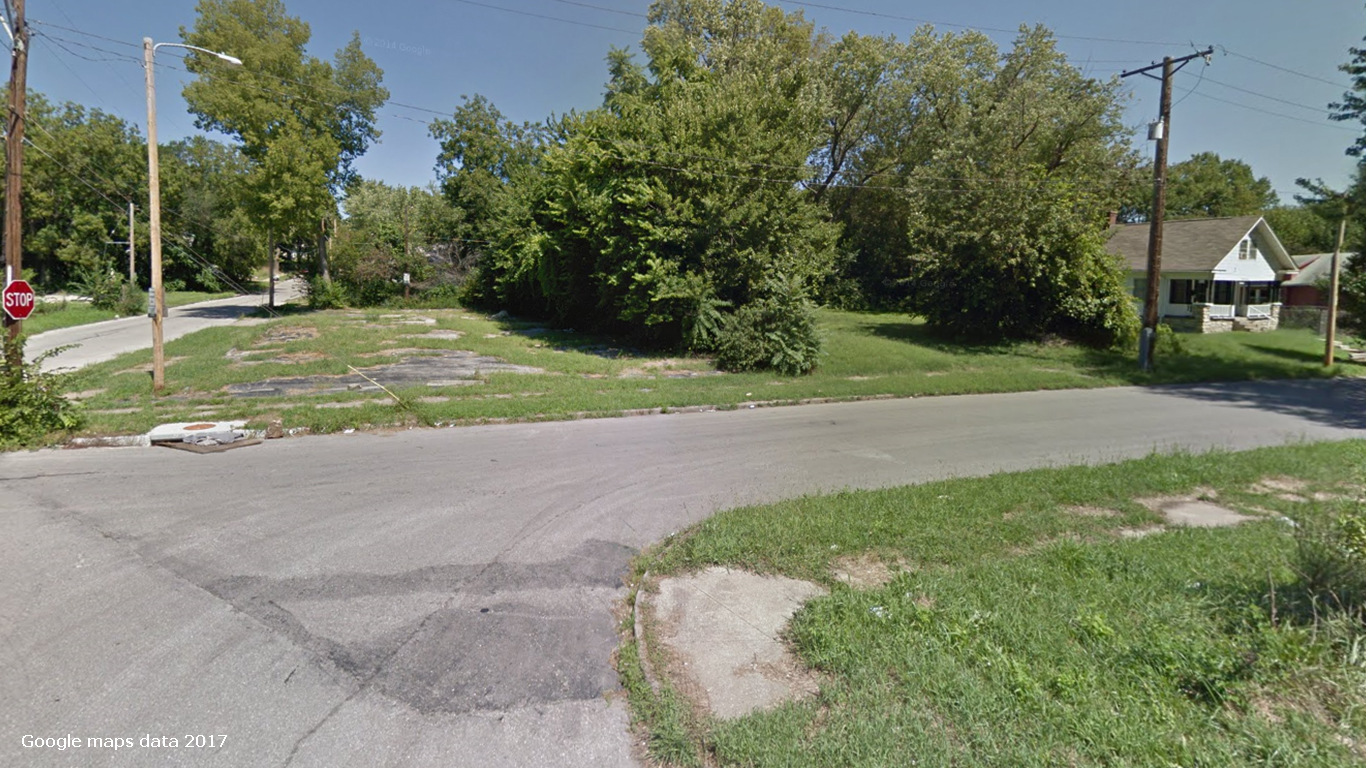
25. ZIP 64128 (Kansas City, Missouri)
> Vacant properties: 877 (17.4%)
> 5 yr. population change: 1.9%
> Population: 12,370
> Median home value: $43,100
Kansas City’s 64128 ZIP code has a near nation-leading home vacancy rate and near rock bottom real estate prices. There are some 877 vacant homes in the area, or 17.4% of all residentials structures. A high vacancy rate often reflects low demand, which can manifest in low home values. The typical home in the 64128 ZIP code is worth only $43,100 — less than a quarter of the median home value nationwide of $178,600.
The low home values make the area attractive to real estate investors. Some 86% of vacant homes in the area are owned by investors, a considerably larger share than the share nationwide of 75.5%. Area investors may be able to get a return on their investment in the coming years. Unlike most ZIP codes on this list, this area’s population has grown slightly in the last half decade, which could presage increased demand for housing.
[in-text-ad]
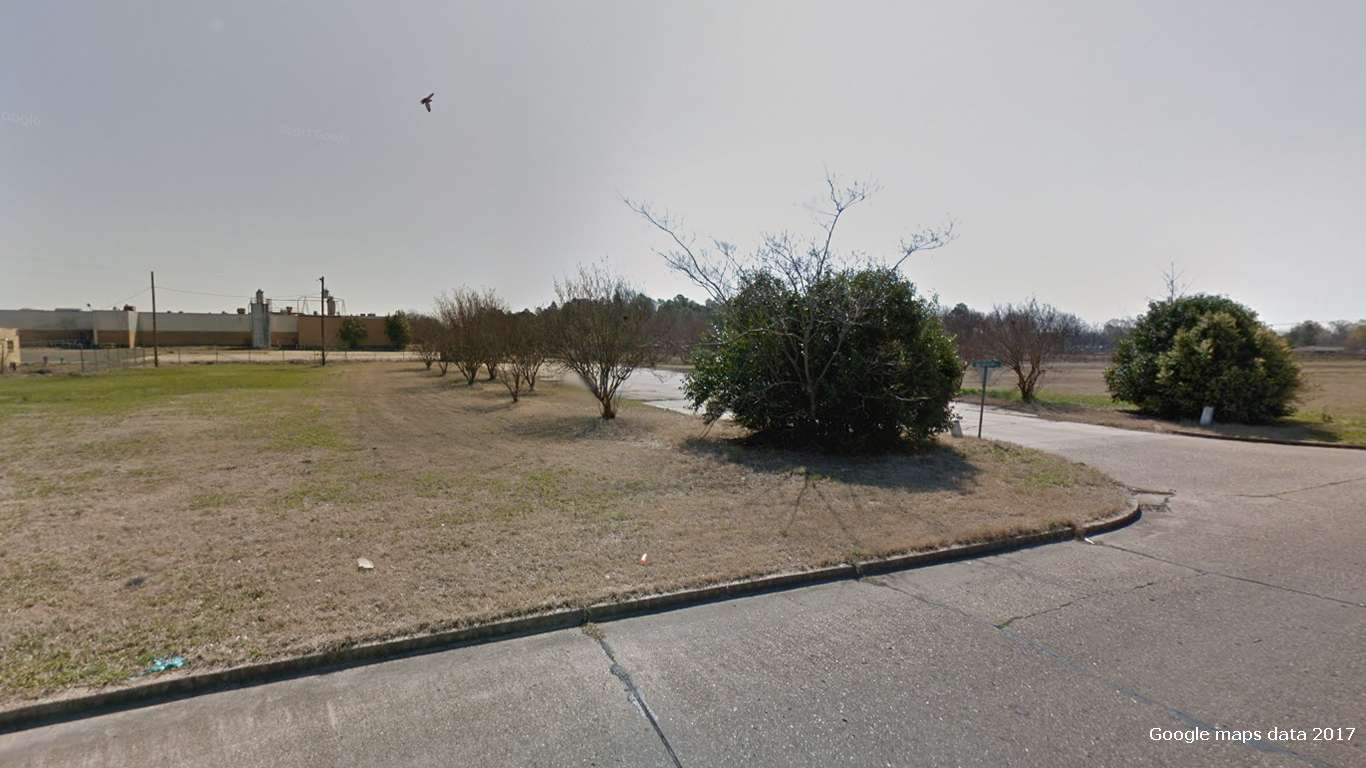
24. ZIP 38701 (Greenville, Mississippi)
> Vacant properties: 616 (17.4%)
> 5 yr. population change: -6.5%
> Population: 22,790
> Median home value: $81,800
Situated in the Mississippi Delta along the eastern shore of the river, the 38701 ZIP code in Greenville, Mississippi is one of the few places in the country with a high vacancy rate that is not a part of a major metropolitan area. In the last five years, the area lost some 6.5% of its population, keeping with the nationwide trend of declining rural populations. The smaller population is partially responsible for the relatively large share of vacant homes in the area. There are over 600 vacant properties in the 38701 ZIP code, or 17.4% of all area homes.
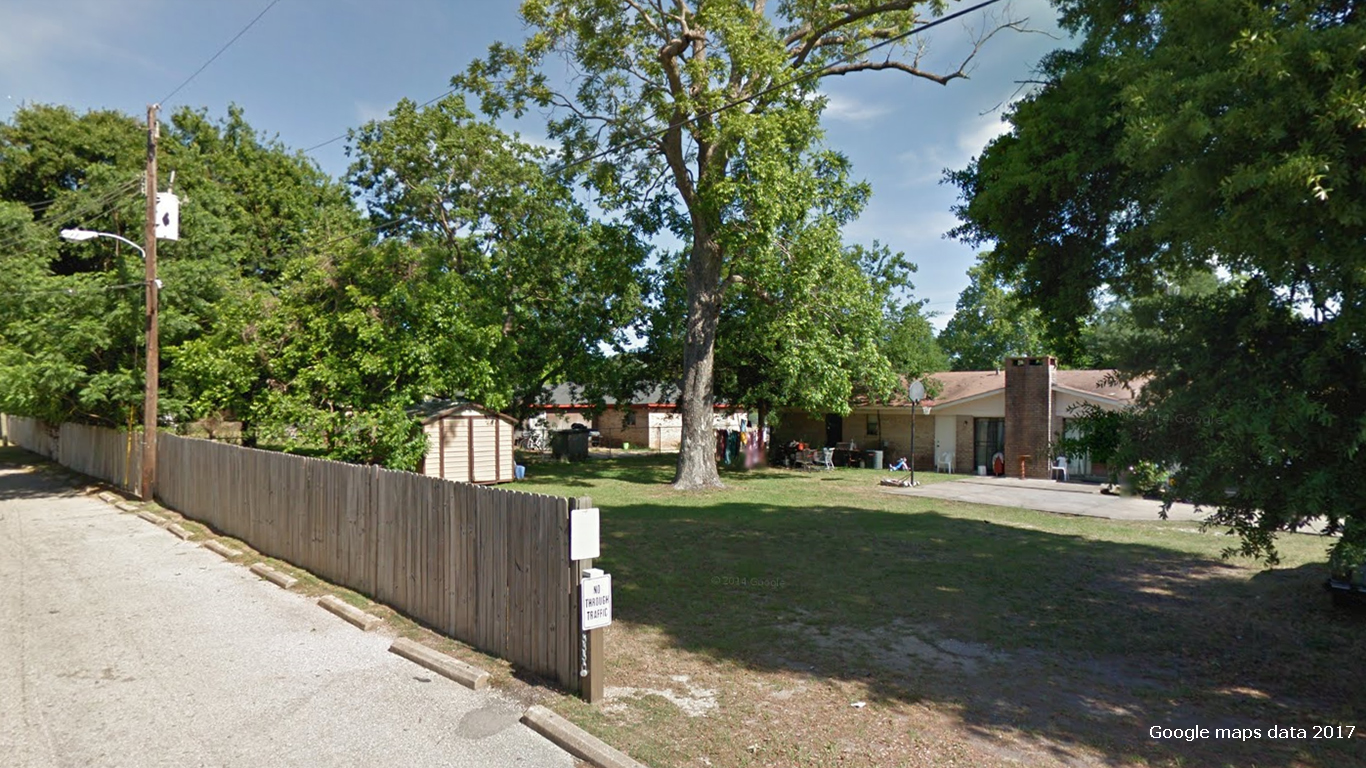
23. ZIP 36610 (Mobile, Alabama)
> Vacant properties: 946 (17.5%)
> 5 yr. population change: -13.0%
> Population: 11,302
> Median home value: $49,500
An estimated 946 homes in the 36610 ZIP code in Mobile, Alabama are vacant, a 5% increase from 2015. The uptick comes amidst a 13% five-year population decline. Dangerous communities are objectively less desirable places to live, and Mobile’s high violent crime rate may be pushing people out. There were 585 violent crimes in the metro area for every 100,000 residents in 2016, far more than the U.S. violent crime rate of 386 incidents per 100,000 people.
A contracting population can lead to a depressed real estate market, and in Mobile’s 36610 ZIP code, the typical home is worth only $49,500, well below the median home value nationwide of $178,600. Real estate investors appear to be taking advantage of the area’s low property values. Some 85.4% of vacant properties in the area are owned by investors, a larger share than the national share of 75.5%.
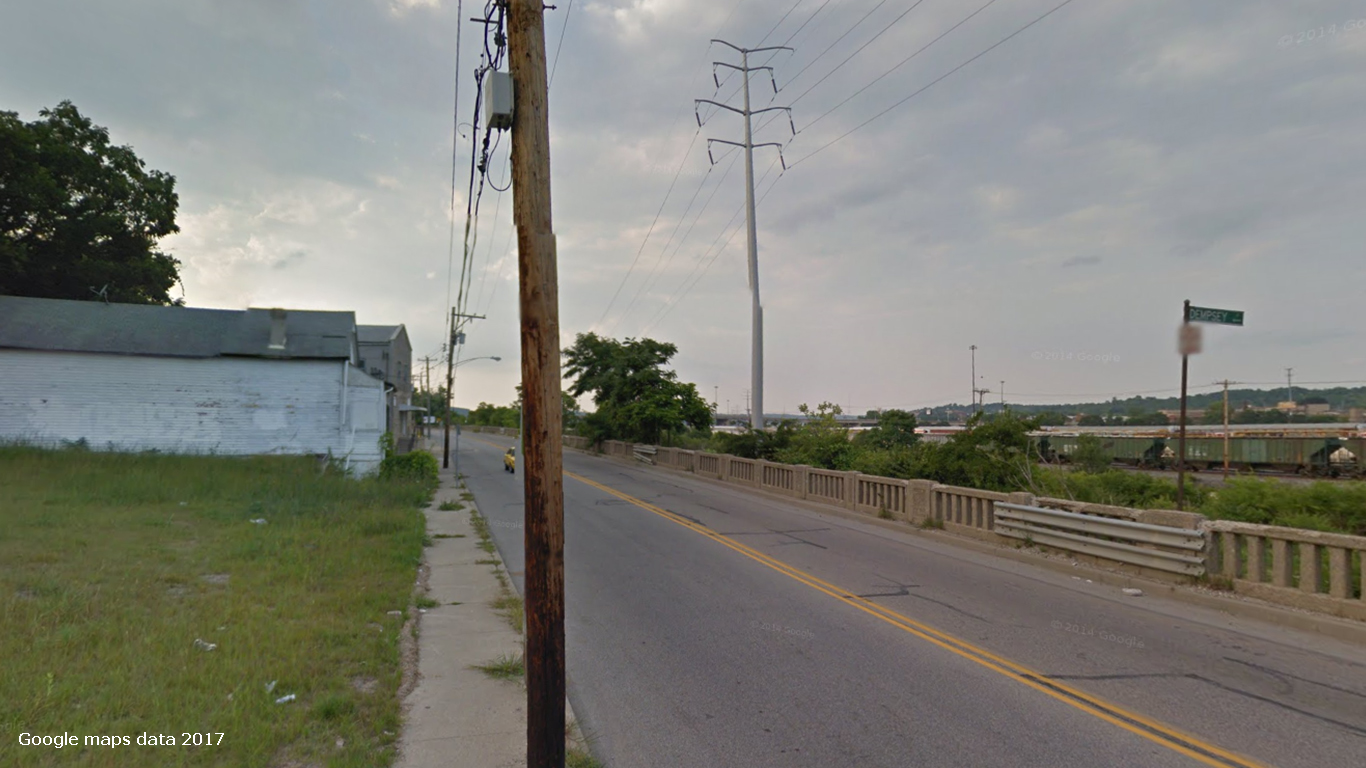
22. ZIP 45214 (Cincinnati, Ohio)
> Vacant properties: 296 (17.7%)
> 5 yr. population change: -12.7%
> Population: 8,014
> Median home value: $62,400
The 45214 ZIP code in Cincinnati is one of four areas in Ohio with among the nation’s highest vacancy rates. Unlike many other parts of the Midwest, Cincinnati has undergone something of a resurgence in recent years. According to the Bureau of Economic Analysis, Cincinnati’s economic growth of 2.5% in 2016 was faster than any other major city in the Midwest and faster than the average GDP growth across all metro areas of 1.7%.
Not all parts of the metro area are thriving, however. In the past half decade, Cincinnati’s 45214 ZIP code lost some 12.7% of its total population, partially contributing to a 17.7% home vacancy rate. Reduced demand for housing has likely depressed the area’s housing market, as the typical area home is only worth $62,400, well below median home value nationwide of $178,600.
[in-text-ad-2]
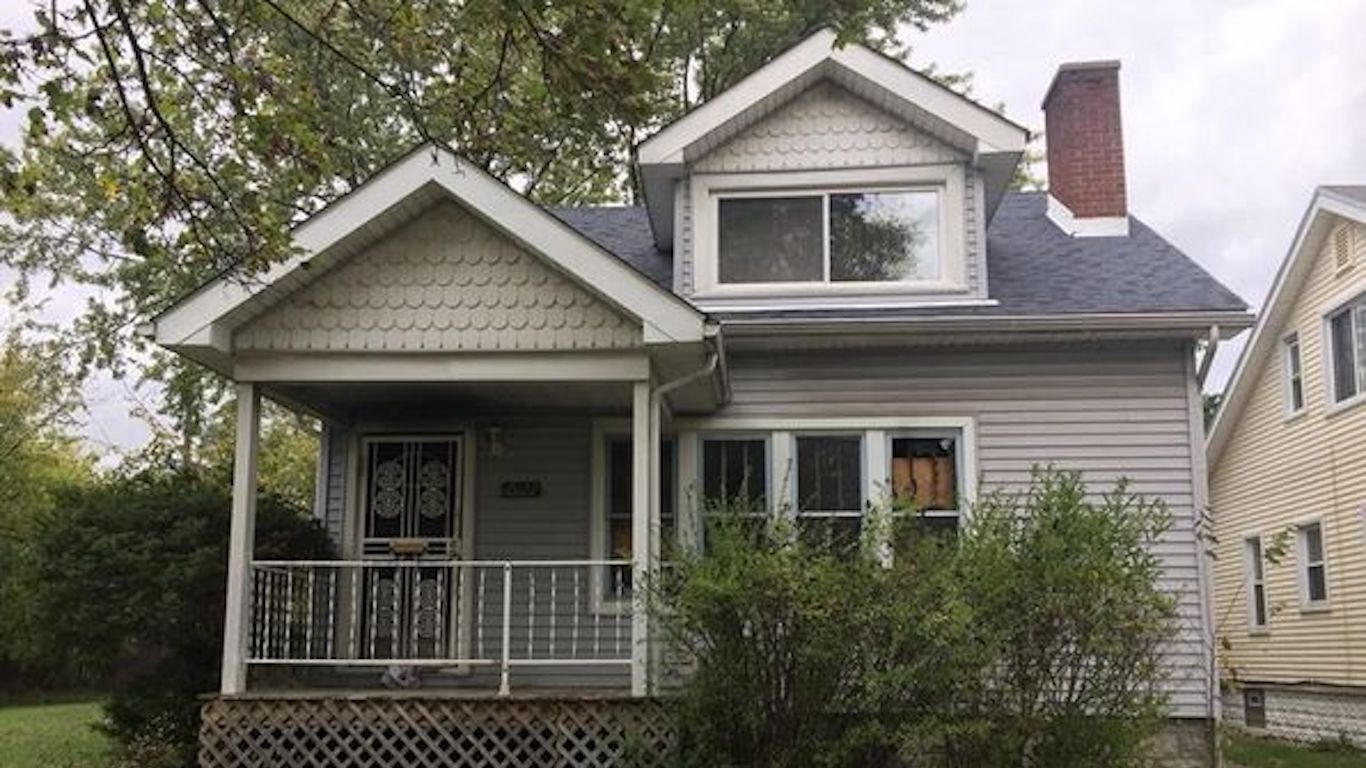
21. ZIP 48204 (Detroit, Michigan)
> Vacant properties: 2,004 (17.9%)
> 5 yr. population change: -9.7%
> Population: 25,637
> Median home value: $31,800
No city has suffered more from the decline of American manufacturing than Detroit, Michigan. Market forces pushed manufacturing plants out of the city in the second half of the 20 century, leaving behind widespread economic and social strife. The area’s high crime rate compounds the problems brought on by the dearth of jobs, pushing residents out of the city. There were 556 violent crimes the Detroit metro area for every 100,000 residents in 2016, well above the 386 per 100,000 U.S. violent crime rate.
Over the last five years, the 48204 ZIP code in Detroit lost some 10% of its total population. Today, it is one of four ZIP codes within the Motor City where over 17% of all homes are vacant. Low demand for housing has likely depressed home values, and the typical house in the ZIP code is worth only $31,800.
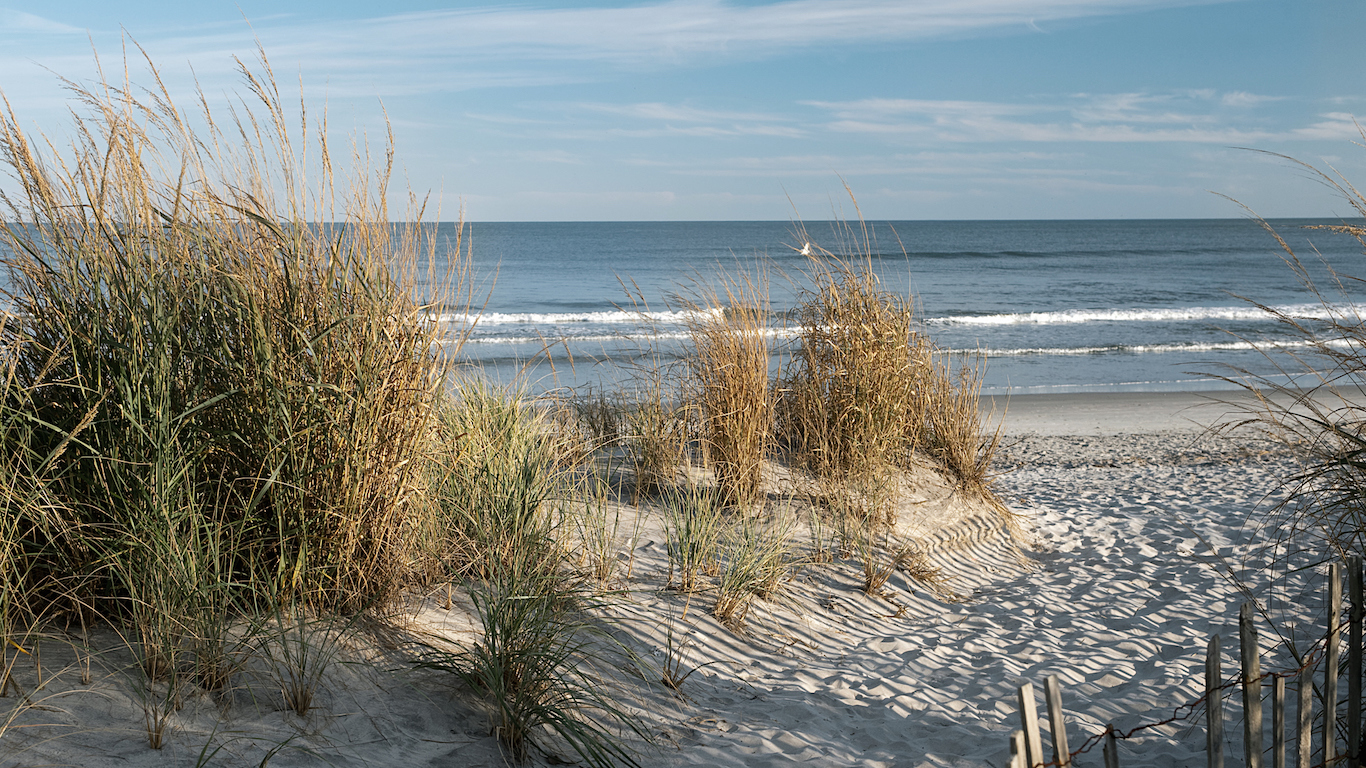
20. ZIP 08203 (Brigantine, New Jersey)
> Vacant properties: 1,987 (17.9%)
> 5 yr. population change: -4.9%
> Population: 9,347
> Median home value: $364,000
When home prices fall in an area, their value can sink below their mortgage, meaning homeowners owe more on the home than it is worth. Families with these underwater properties may have an impetus to leave the area, even though it often means selling their homes at a loss. In other cases, homeowners may leave without selling the home, which appears to be relatively common in this Atlantic City neighborhood. Of the estimated 852 underwater properties in ZIP 08203, nearly 150, or 17.3%, are vacant, versus the national average underwater vacancy rate of 1.8% and one of the higher such percentages of areas on this list.
As is generally the case in America’s budding ghost towns, the population of the neighborhood has declined by 4.9% over the past five years. Unlike most neighborhoods with the highest vacancy rates, on the other hand, the median home value of $364,000 is far higher than is typical nationwide.
[in-text-ad]
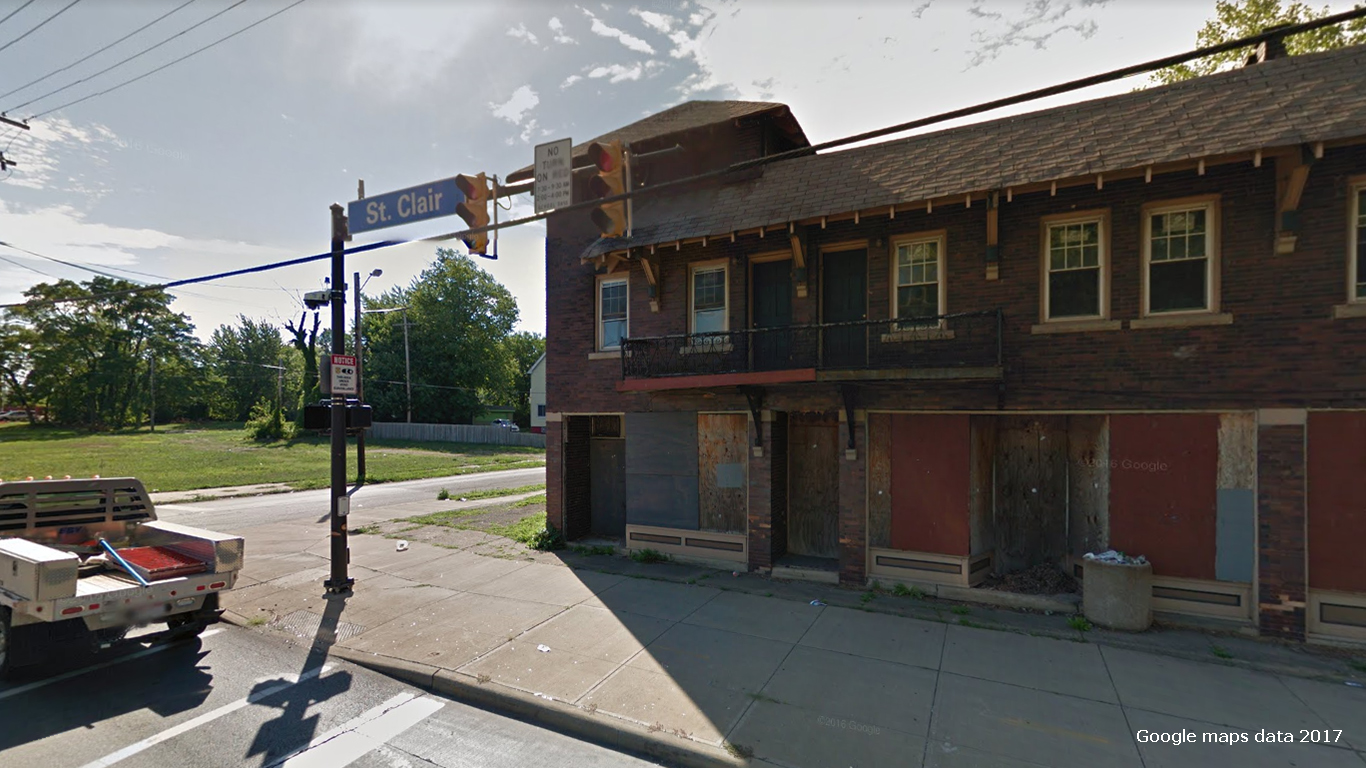
19. ZIP 44112 (Cleveland, Ohio)
> Vacant properties: 1,297 (18.0%)
> 5 yr. population change: -7.9%
> Population: 22,465
> Median home value: $65,200
A Rust Belt city, Cleveland lost more than half of its population since 1950. More recent trends in parts of the city do not suggest an impending comeback. In the East Cleveland 44112 ZIP code, for example, the population declined by 7.9% in the last five years. In the same part of the city, an estimated 18.0% of homes are vacant. Of the 1,297 vacant properties in the ZIP code, 259 appear to have been abandoned because owners owed more on the home that it was worth. Declining populations will typically depress home values, and in Cleveland’s 44112 ZIP, the typical home is worth only $65,200, or about $113,400 less than the median home value nationwide.
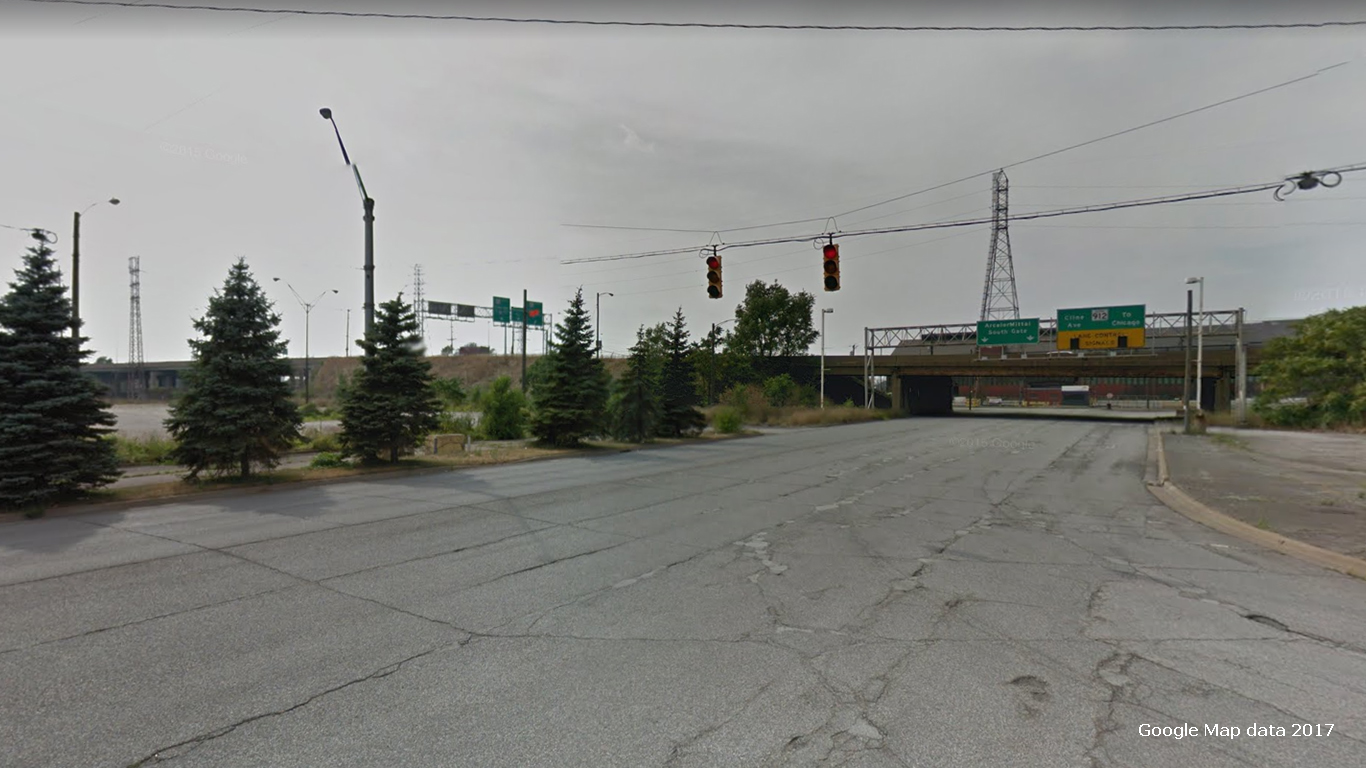
18. ZIP 46406 (Gary, Indiana)
> Vacant properties: 644 (18.0%)
> 5 yr. population change: -4.3%
> Population: 9,658
> Median home value: $58,300
The 46406 ZIP code is one of four in Gary, Indiana with a far higher than typical home vacancy rate. Currently, some 644 of the 3,581 properties in the area are vacant, a 7% increase from 2016. As is the case in most parts of the country with high vacancy rates, home values are low in the ZIP code. The typical area home is worth only $58,300, well below the median home value nationwide of $178,600.
Often times, real estate investors buy properties in areas with low home values and high vacancy rates under the assumption that demand and home values will improve. However, relatively few investors are buying up land in Gary’s 46406 ZIP code. Only 66.6% of vacant properties in the area are investor owned, compared to 75.5% of vacant homes nationwide.
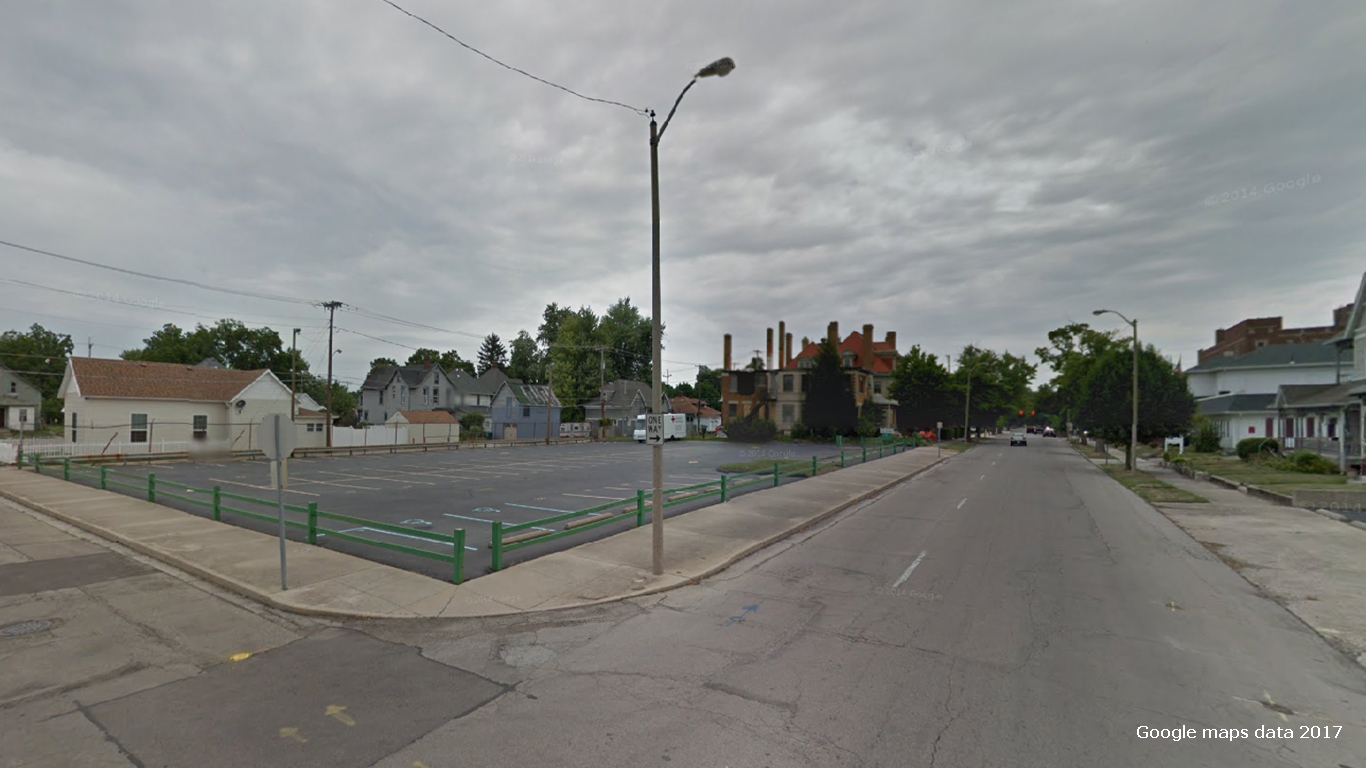
17. ZIP 47305 (Muncie, Indiana)
> Vacant properties: 215 (18.2%)
> 5 yr. population change: -13.5%
> Population: 3,986
> Median home value: $52,300
Muncie, Indiana is one of several Midwestern towns on this list with neighborhoods that are losing residents. In the last five years, Muncie’s population declined by 13.5%. With fewer residents, property values in the area have suffered. The typical area home is worth only $52,300, or about $126,300 less than the typical American home.
Unlike many parts of the country on this list, conditions appear to be improving in Muncie’s 47305 ZIP code. The area’s home vacancy rate fell from 21.1% in 2016 to 18.2% in 2017. Investors are also willing to buy up many of the area’s vacant homes. An estimated 84.7% of vacant properties in the area are owned by real estate investors, a larger share than the 75.5% of vacant homes nationwide.
[in-text-ad-2]

16. ZIP 95321 (Groveland, California)
> Vacant properties: 593 (18.9%)
> 5 yr. population change: 0.3%
> Population: 3,432
> Median home value: $265,300
Unlike most parts of the country with high vacancy rates, Groveland, California’s 95321 ZIP code, largely comprised of parts of Yosemite National Park, is characterized by high property values and stable population. Nearly all parts of the country with high vacancy rates have median home values well below $100,000. Meanwhile, in Groveland’s 95321 ZIP, the typical home is worth $265,300, far more than the median home value nationwide of $178,600. As is the case with a handful of ZIP codes on this list, 95321’s high vacancy rate is likely skewed by vacation homes in the area and is not the product of long-term economic and population declines.
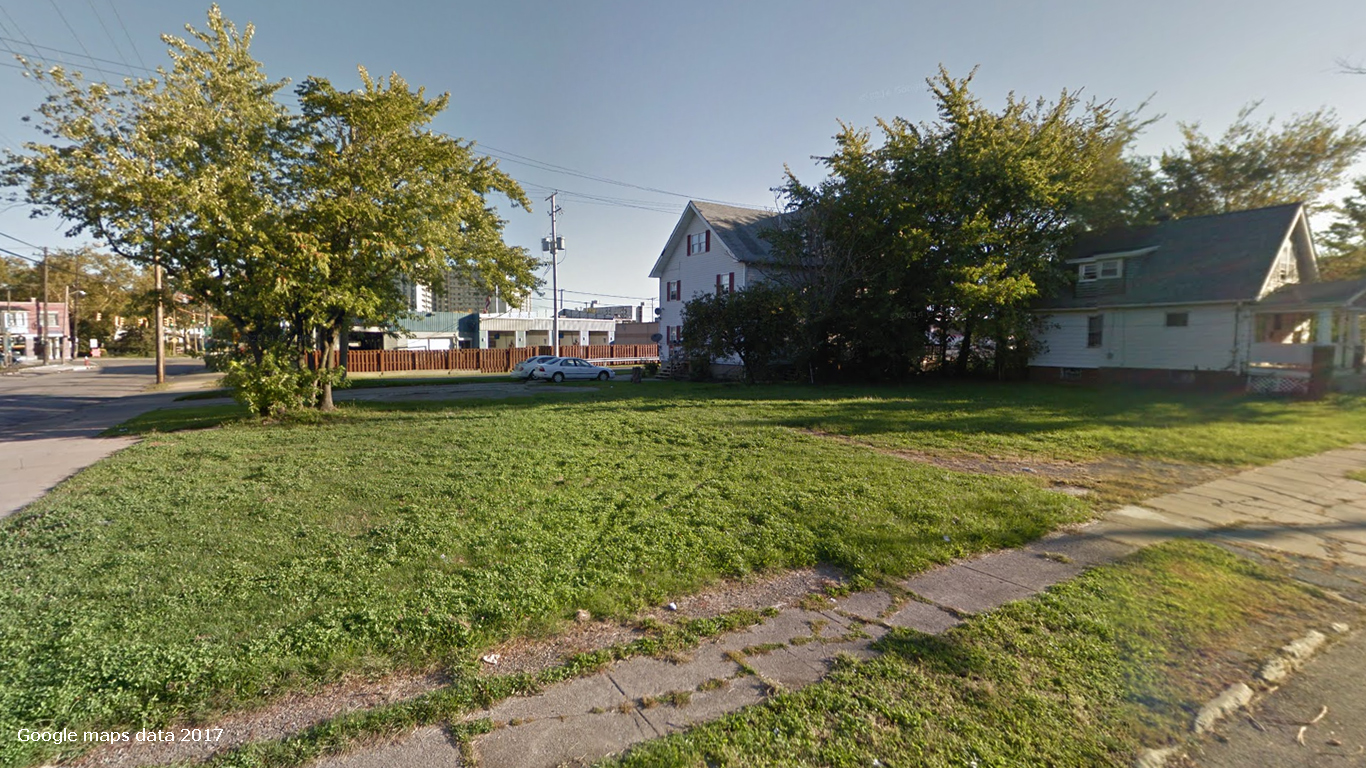
15. ZIP 44108 (Cleveland, Ohio)
> Vacant properties: 1,666 (19.1%)
> 5 yr. population change: -12.8%
> Population: 23,403
> Median home value: $59,300
Like the majority of neighborhoods with the highest vacancy rates, Cleveland’s ZIP 44108 has some of the lowest home values, worst population declines, and a relatively high violent crime rate. These are among the factors most closely related to high concentrations of unoccupied housing units. The typical home in the neighborhood is worth less than $60,000, less than half the national median home value of $178,600. The population dropped by 12.8% to 23,403 over the last five years. And for every 100,000 residents of the surrounding metro area, there were 446 violent crimes in 2016, higher than the national violent crime rate of 386 incidents per 100,000 people.
[in-text-ad]
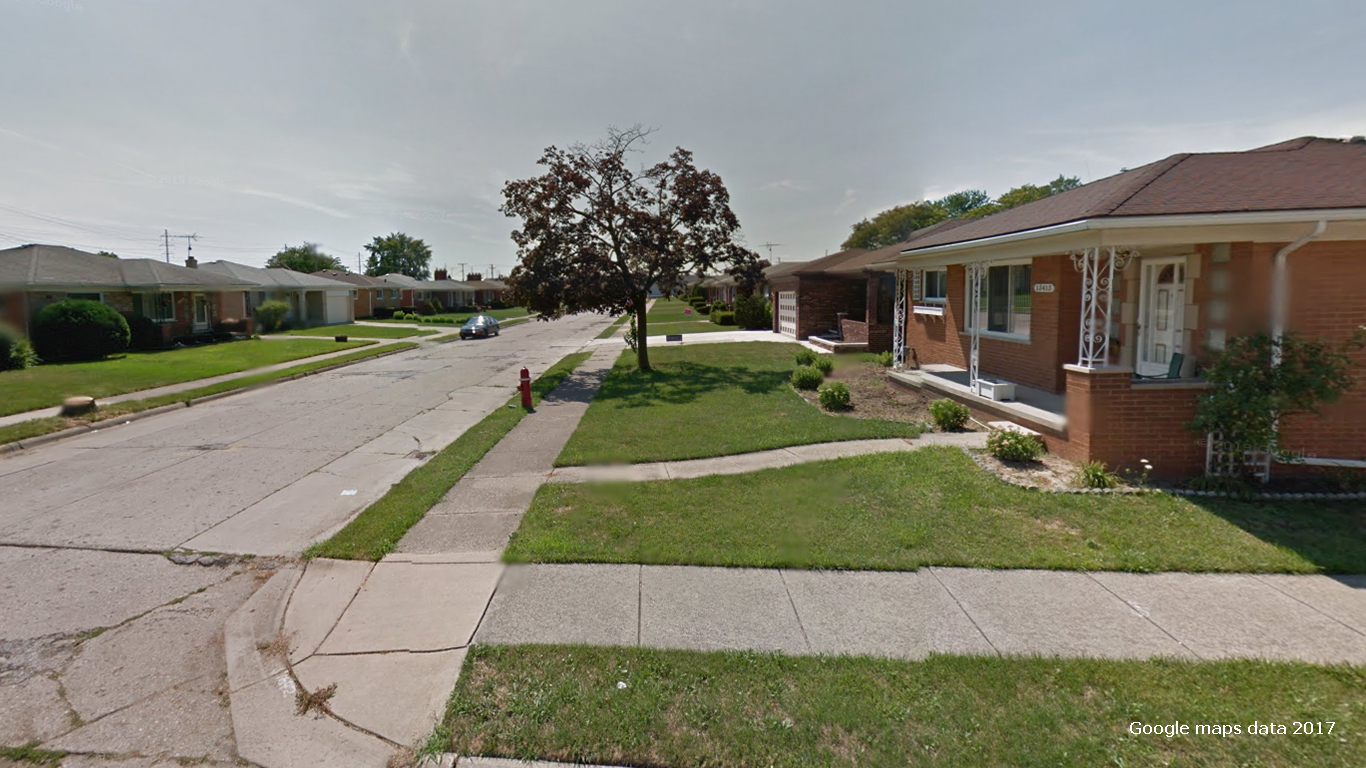
14. ZIP 48205 (Detroit, Michigan)
> Vacant properties: 2,932 (19.4%)
> 5 yr. population change: -16.4%
> Population: 36,834
> Median home value: $31,900
Detroit’s 48205 ZIP code stretches from East 8 Mile Road on its northern boundary down to the Coleman A. Young International Airport on its southernmost boundary. Few parts of the country are losing residents at a faster rate and have more vacant properties than this section of the Motor City. In the last five years, the ZIP code’s population has declined in size by 16.4%, and currently, about 3,000 area homes have been abandoned.
However, investors appear to be taking advantage of low area home values. A higher than typical 82.1% share of vacant homes in the area are investor owned. Additionally, the number of vacant homes in the area fell by 19% between 2016 and 2017.
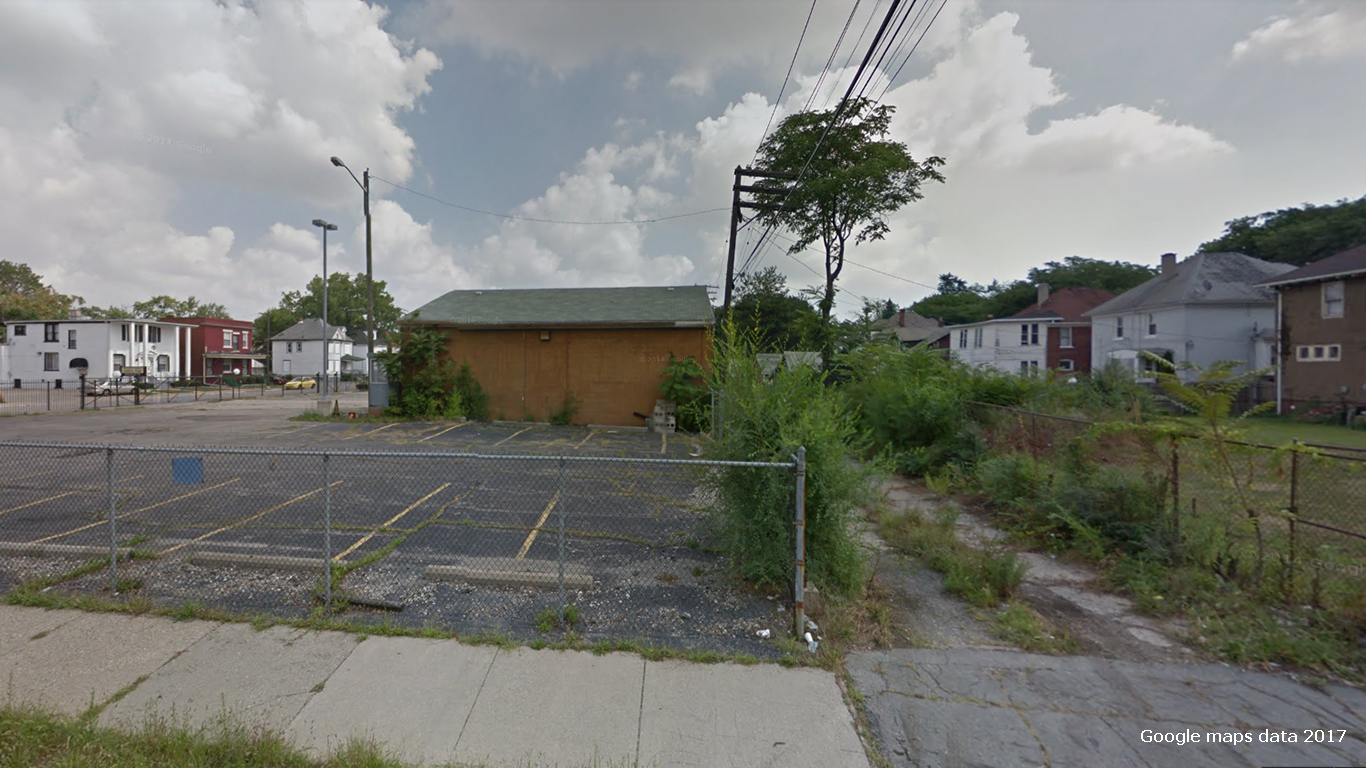
13. ZIP 48206 (Detroit, Michigan)
> Vacant properties: 1,344 (20.1%)
> 5 yr. population change: -20.1%
> Population: 18,424
> Median home value: $43,000
Of the 30 U.S. ZIP codes with the highest home vacancy rates, eight are in Michigan, and more than half of those are in the Detroit metro area. No section of Detroit has a higher home vacancy rate than the 48206 ZIP code. Roughly 1 in every 5 properties in the area have been abandoned and are currently vacant.
Like most other areas on this list, the 48206 ZIP code has been losing residents for years, and property values have taken a hit. In the last five years, the number of area residents fell by 20.1%. Today, the typical area home is worth only $43,000. Many of those living in the area are feeling the pinch from the depressed market. Currently, over 300 area homeowners owe more on their property than it is worth.
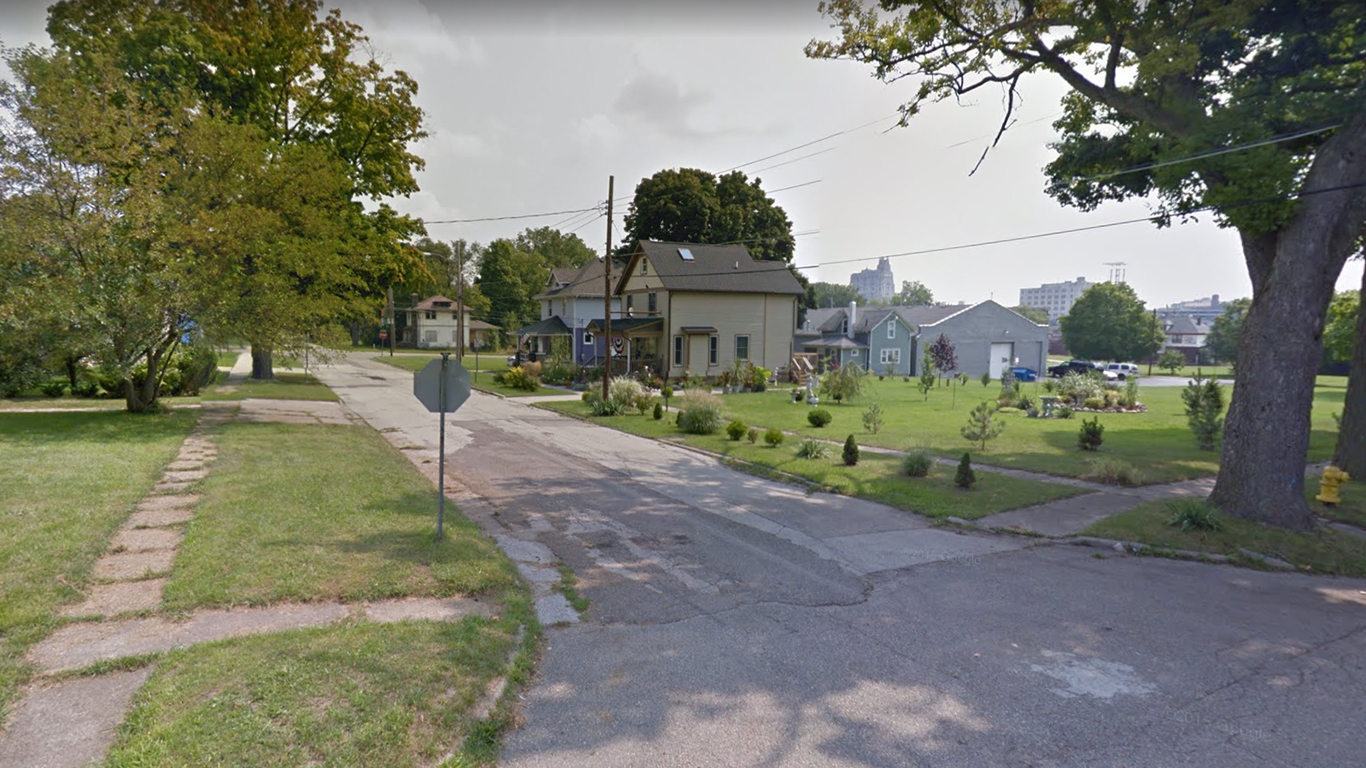
12. ZIP 48504 (Flint, Michigan)
> Vacant properties: 2,348 (20.4%)
> 5 yr. population change: -10.0%
> Population: 28,412
> Median home value: $39,000
Few American cities have suffered more from economic hardship and devastating infrastructure problems in the last several decades than Flint, Michigan. Like much of the former industrial powerhouses of the Midwest, Flint’s economy has been decimated by declines in the manufacturing industry. General Motors was founded in the city over 100 years ago only to move its headquarters in the 1980s and further shut down manufacturing operations in and around the city in subsequent years. More recently, the city has garnered national media attention for elevated lead levels in the public water supply.
Over the last five years, the population of the city’s 48504 ZIP code has declined by 10%. Currently, more than 1 in every 5 area homes have been abandoned and are vacant.
[in-text-ad-2]
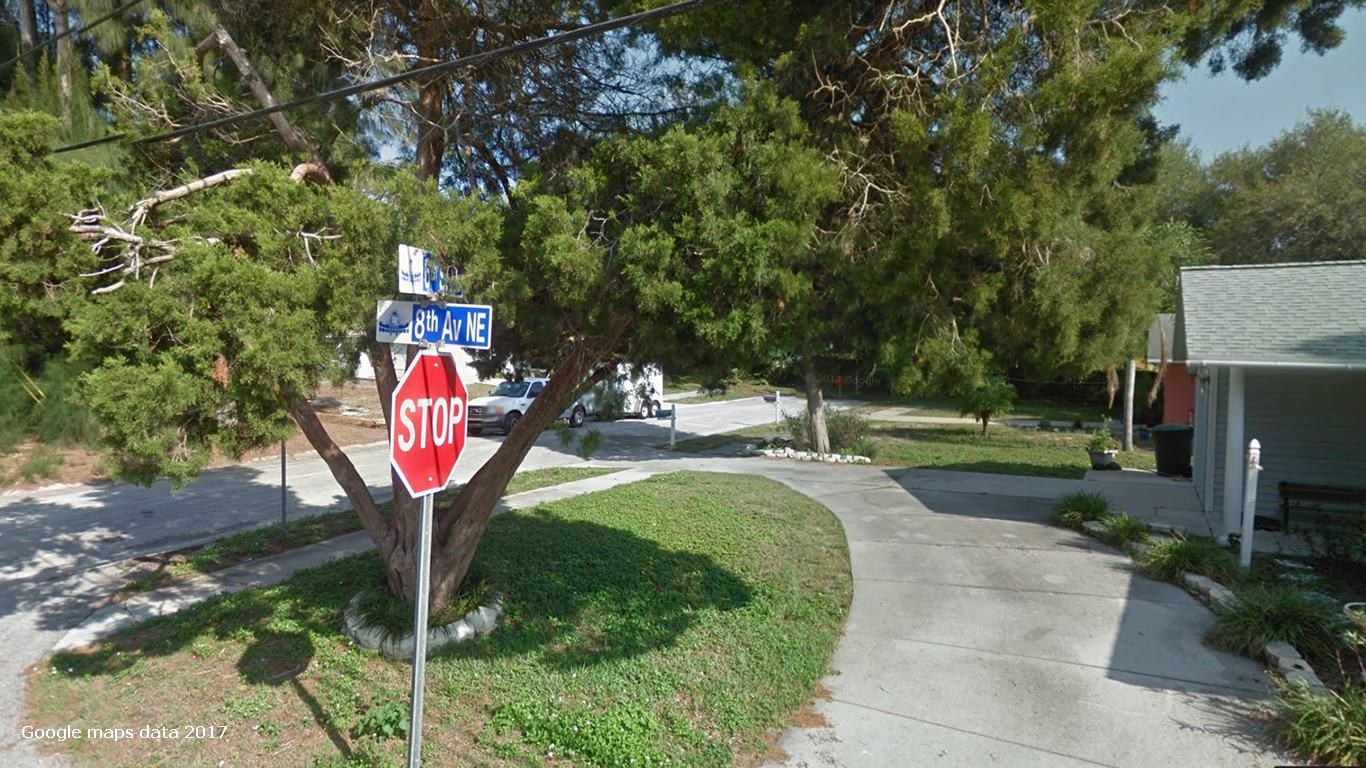
11. ZIP 33786 (Belleair Beach, Florida)
> Vacant properties: 265 (20.7%)
> 5 yr. population change: 7.4%
> Population: 1,747
> Median home value: $579,500
The vast majority of ZIP codes on this list are economically depressed with rapidly dwindling populations. The 33786 ZIP code in Belleair Beach, Florida is not one of them. The typical area home is worth $579,500, and the area’s population has grown by 7.4% in the last five years. The ZIP code covers part of a strip of land off Florida’s western coast in the Gulf of Mexico. While many vacant homes in the United States have been effectively abandoned, homes marked as vacant in this ZIP code likely serve as second, or vacation homes for their owners.
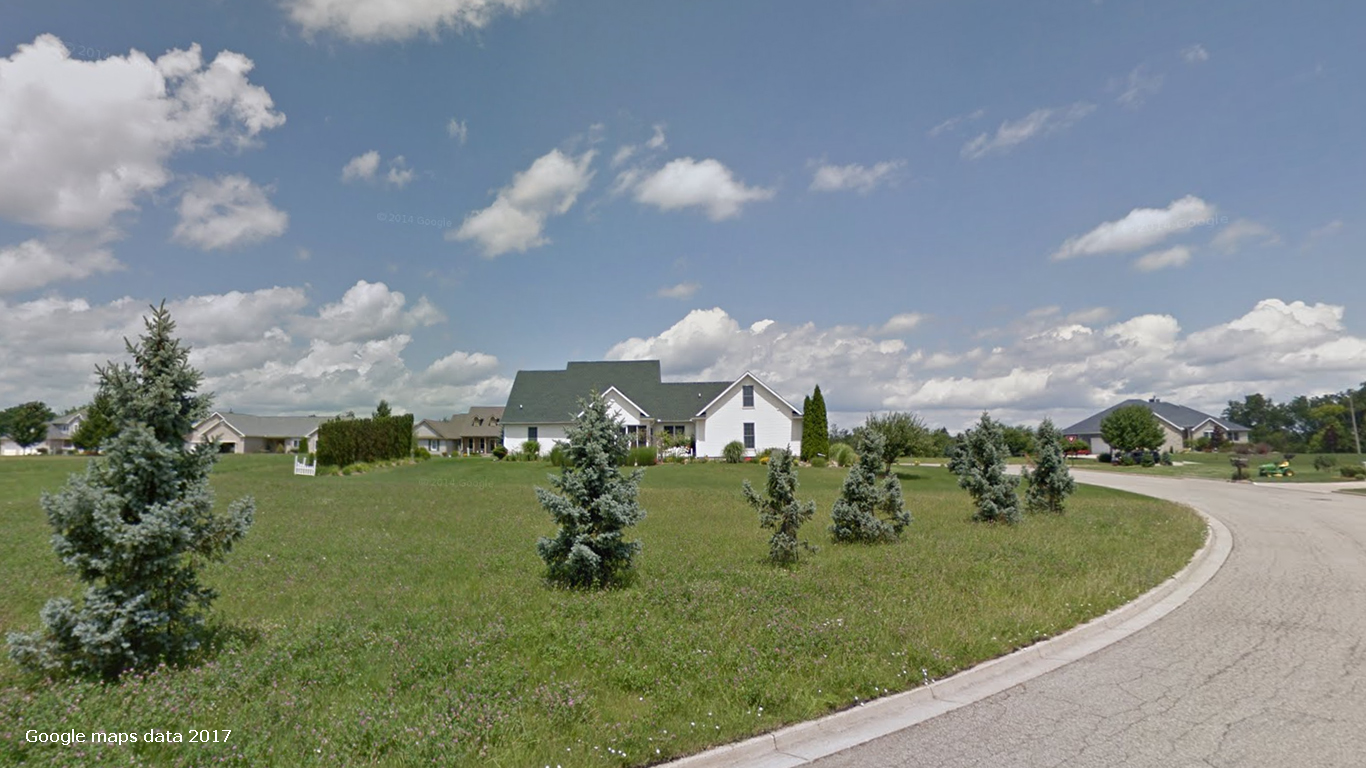
10. ZIP 49253 (Manitou Beach, Michigan)
> Vacant properties: 495 (20.9%)
> 5 yr. population change: -8.6%
> Population: 2,874
> Median home value: $171,300
Of the 2,364 residential properties in the Manitou Beach postal zone 49253, nearly 500 — or about 1 in every 5 — are vacant, putting the area in the top 10 neighborhoods with the highest vacancy rates. High concentrations of unoccupied housing units are usually a sign that people are leaving an area, and the associated low demand for housing tends to push down home prices. ZIP 49253 fits this pattern. It has a five-year population decline of 8.6, and one of the a slightly lower than typical median home value of $171,300.
Together, these factors also tend to attract real estate investors. In ZIP 49253, 88.1% of vacant homes are investment properties.
[in-text-ad]
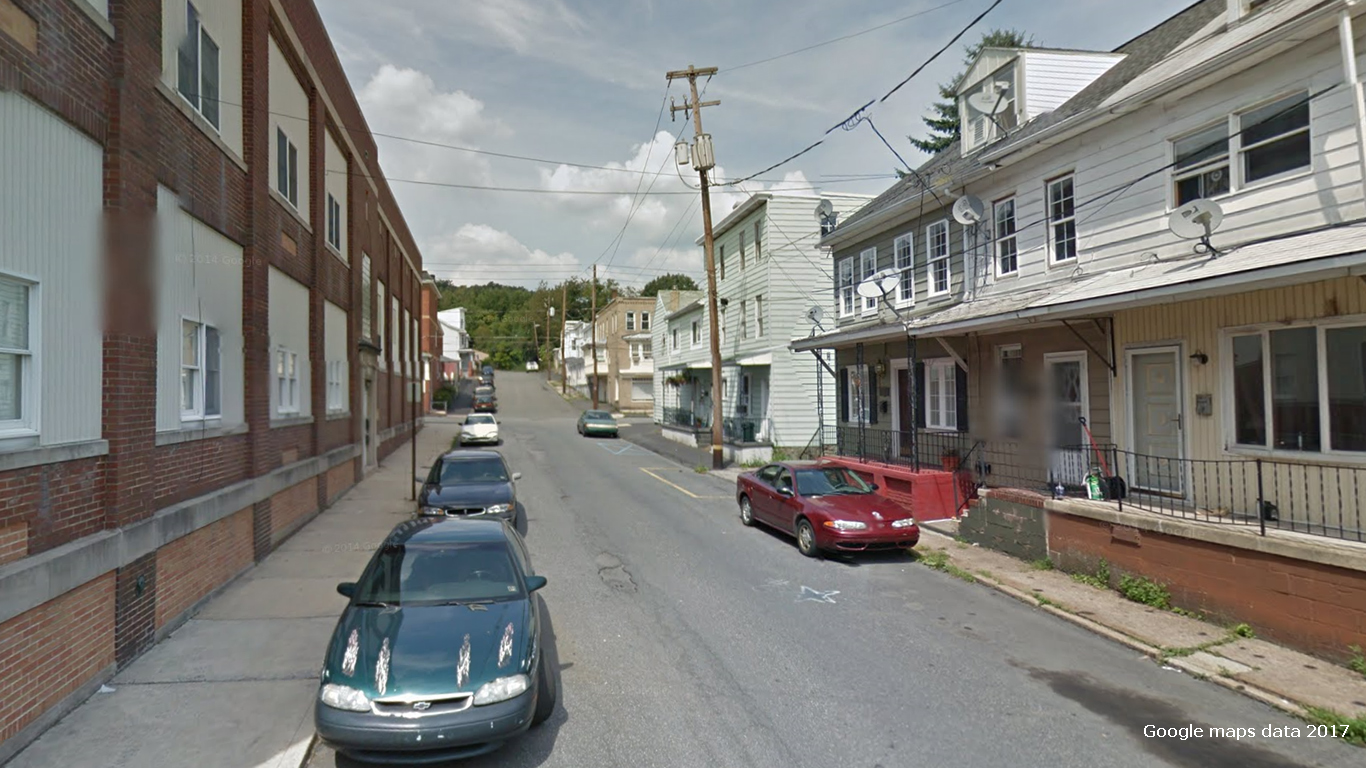
9. ZIP 17976 (Shenandoah, Pennsylvania)
> Vacant properties: 697 (21.5%)
> 5 yr. population change: -3.2%
> Population: 6,644
> Median home value: $37,300
The 17976 ZIP code includes the borough of Shenandoah, Pennsylvania, located about 100 miles northwest of Philadelphia. Shenandoah, once a center for coal mining and clothing manufacturing, is now a shadow of its former self. Hitting a peak population of over 25,000 residents in 1910, Shenandoah is currently home to fewer than 5,000 people.
Currently, across the broader 17976 ZIP code, more than 1 in every 5 properties are vacant. Population declines often precipitate a high rate of vacant properties, and in the last five years, the ZIP code’s population has contracted by 3.2%.

8. ZIP 33785 (Indian Rocks Beach, Florida)
> Vacant properties: 1,259 (23.5%)
> 5 yr. population change: -1.5%
> Population: 5,641
> Median home value: $339,600
As Daren Blomquist of ATTOM Data Solutions explained, high concentrations of vacation homes — indicated by high home values — might skew vacancy rates up in some of these neighborhoods. ZIP code 33785 in Indian Rocks Beach, Florida is likely one of just a few such examples. While economic conditions in most towns on this list tell a story of degraded home values and population flight, the median home in this ZIP code is $339,600, well above the national median of $178,600. On the other hand, the population of the Indian Rocks Beach neighborhood declined by 1.5% over the last five years.
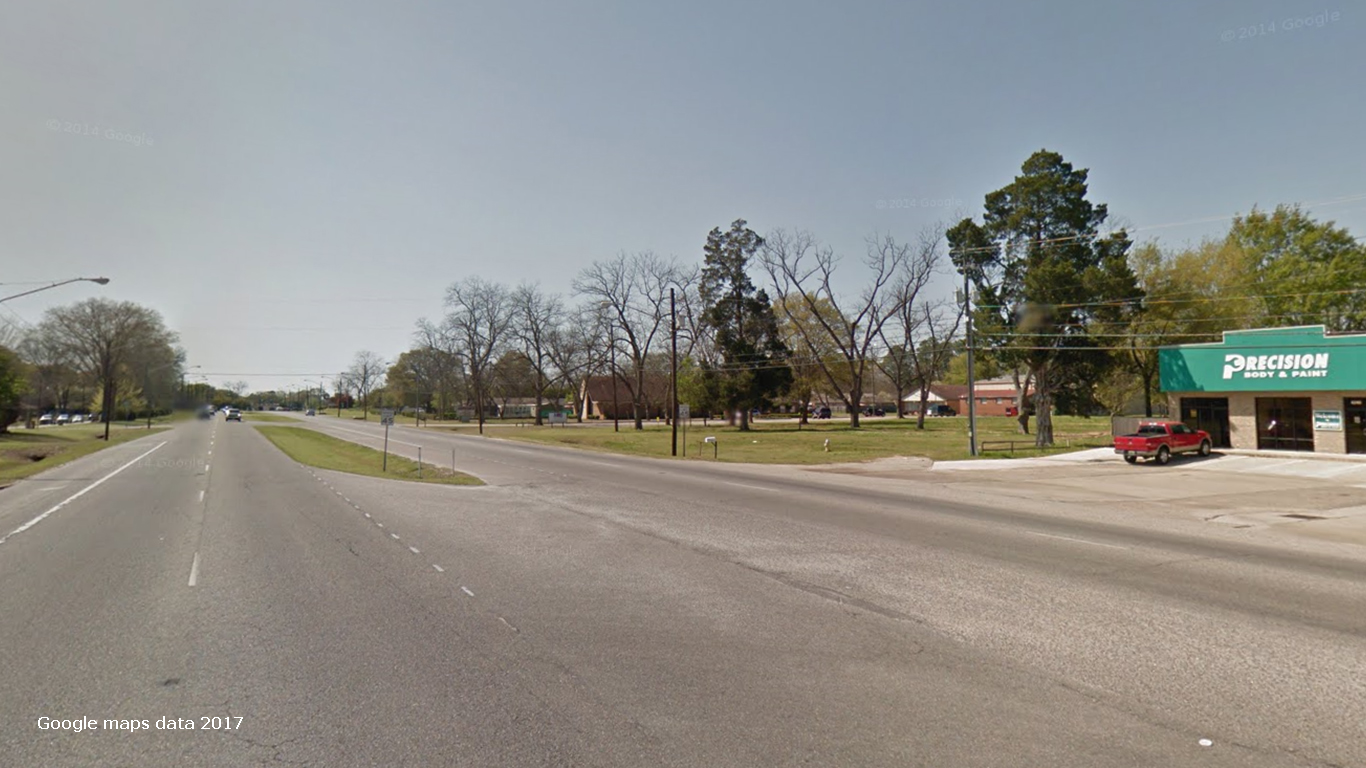
7. ZIP 36104 (Montgomery, Alabama)
> Vacant properties: 612 (24.6%)
> 5 yr. population change: -19.5%
> Population: 8,393
> Median home value: $76,800
ZIP 36104 comprises much of Alabama’s capital city along the Gun Island Chute and Alabama River. The area has been suffering in recent years as the number of vacant homes can attest. The number of vacant homes climbed from 508 in 2016 to 612 in 2017 — or about 1 in every 4 properties. Population declines often precipitate high home vacancy rates, and in the last five years, the area’s population declined by nearly 20%.
Many in the region blame violent crime for the apparent outward migration. There were 472 violent crimes for every 100,000 residents in the broader Montgomery metro area in 2016, far more than the U.S. violent crime rate of 386 incidents per 100,000.
[in-text-ad-2]
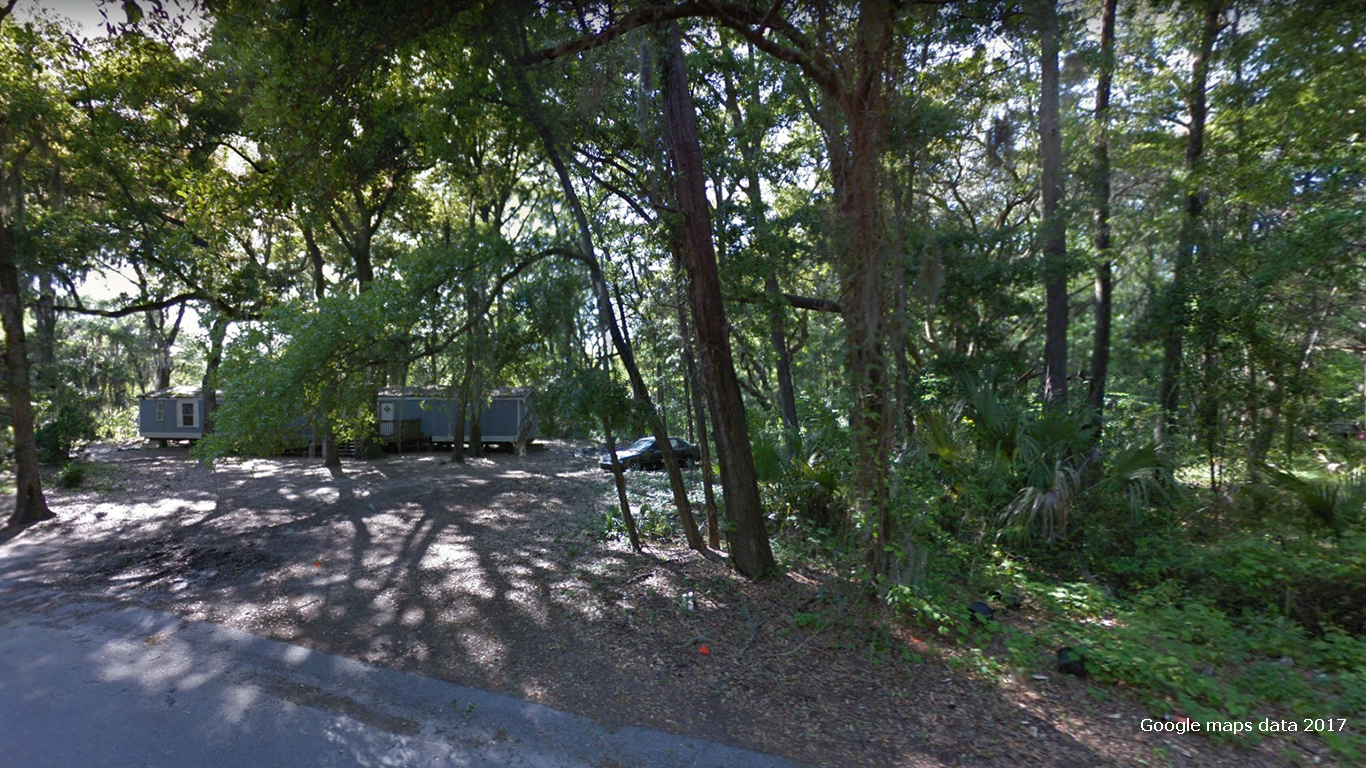
6. ZIP 29928 (Hilton Head Island, South Carolina)
> Vacant properties: 4,928 (25.9%)
> 5 yr. population change: 12.9%
> Population: 17,270
> Median home value: $512,500
A property might be unoccupied for any number of reasons. While the areas with the highest vacancy rates tend to fit the consistent pattern of economic malaise, the presence of vacation homes may also skew vacancy rates up in some neighborhoods. ZIP 29928 in Hilton Head Island is one such example. Not only is the median home value of $512,500 in the ZIP code well more than double the national median and one of the highest in the nation, but also the area’s population grew by 12.9% over the last five years, also one of the faster growths.
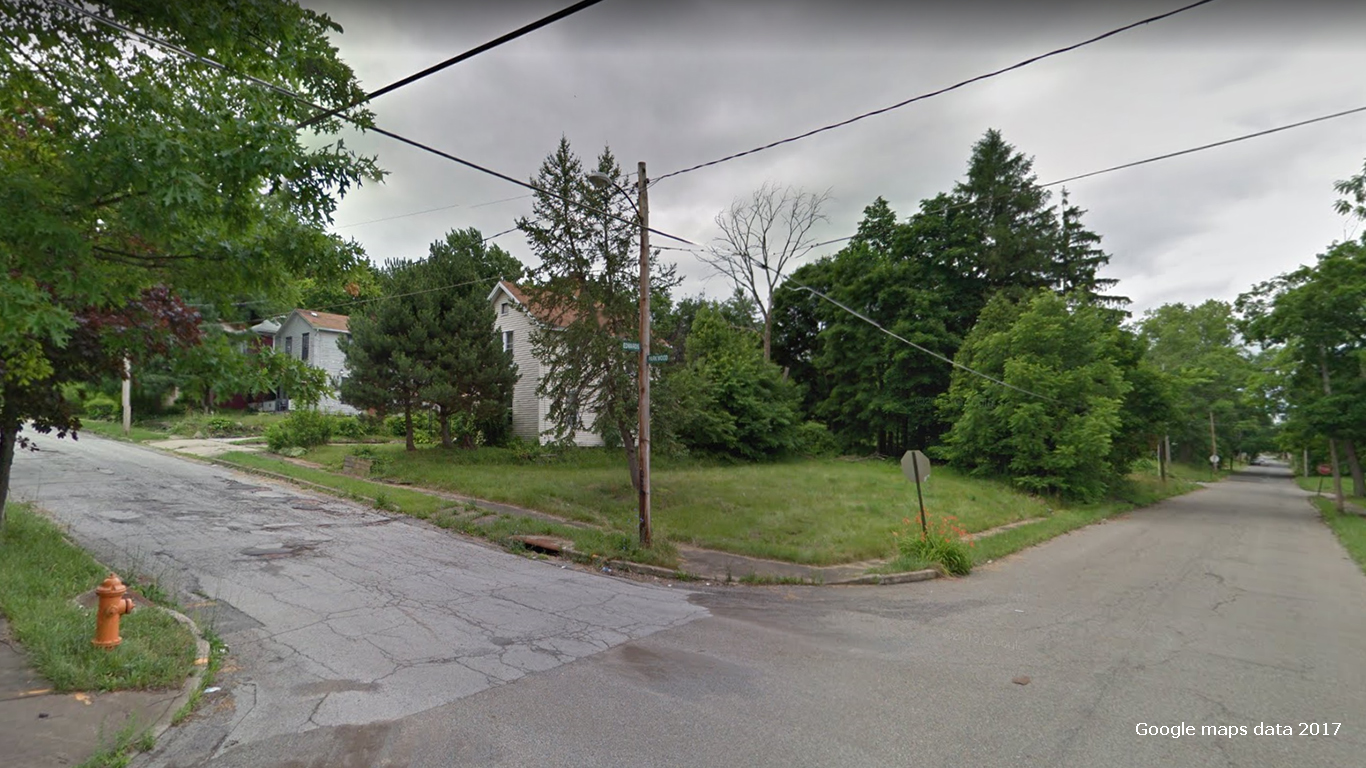
5. ZIP 44507 (Youngstown, Ohio)
> Vacant properties: 593 (26.0%)
> 5 yr. population change: -11.3%
> Population: 5,313
> Median home value: $19,700
Approximately 75% of unoccupied homes across the country are investment properties. In the neighborhoods with the highest vacancy rates, this percentage tends to be even higher, likely because the economic malaise plaguing many of these neighborhoods is at the same time an opportunity for individuals with resources to invest. By contrast, in Youngstown’s ZIP 44507, the percentage of vacant properties owned by investors of 64.9% is exceptionally low. This is likely reflective of the area’s especially poor economic conditions — so poor that many investors do not see an opportunity. The median home value of less than $20,000 is a fraction of the national median and one of the very lowest compared to thousands of postal codes.
[in-text-ad]
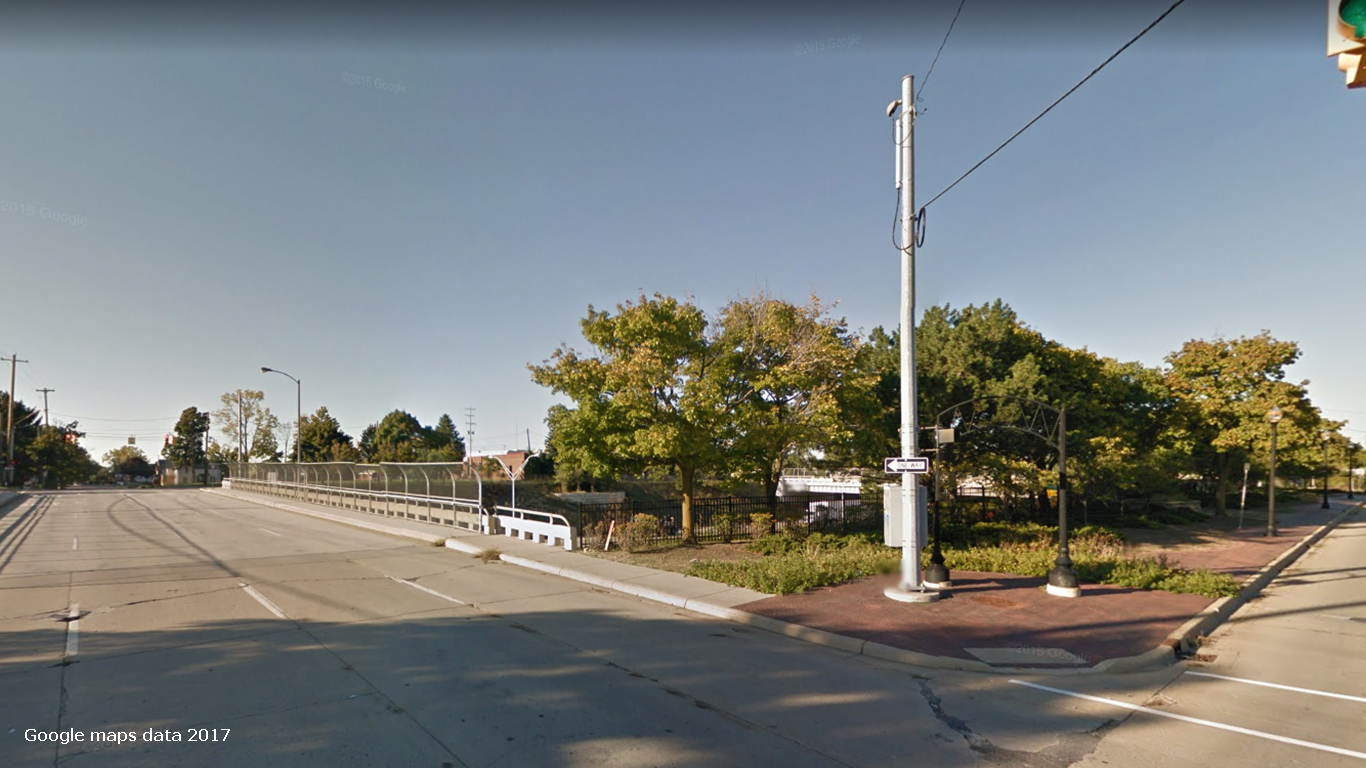
4. ZIP 48505 (Flint, Michigan)
> Vacant properties: 3,035 (29.0%)
> 5 yr. population change: -15.0%
> Population: 21,938
> Median home value: $27,400
ZIP 48505 is one of eight neighborhoods on this list in Michigan, and one of two in Flint. The pattern speaks to poor economic conditions the region continues to struggles with. Many area neighborhoods have yet to recover from the Great Recession and seem to be turning into ghost towns. It is impossible to trace the problem to one source. But as is generally the case in once vibrant, largely manufacturing-based economies, the population of this Flint neighborhood has also declined precipitously in recent years, by 15% since 2011. The surrounding area’s violent crime rate of 628 incidents per 100,000 metro area residents is one of the highest rates in the nation and a likely contributor to the population flight. Currently, nearly 30% of area homes are unoccupied.
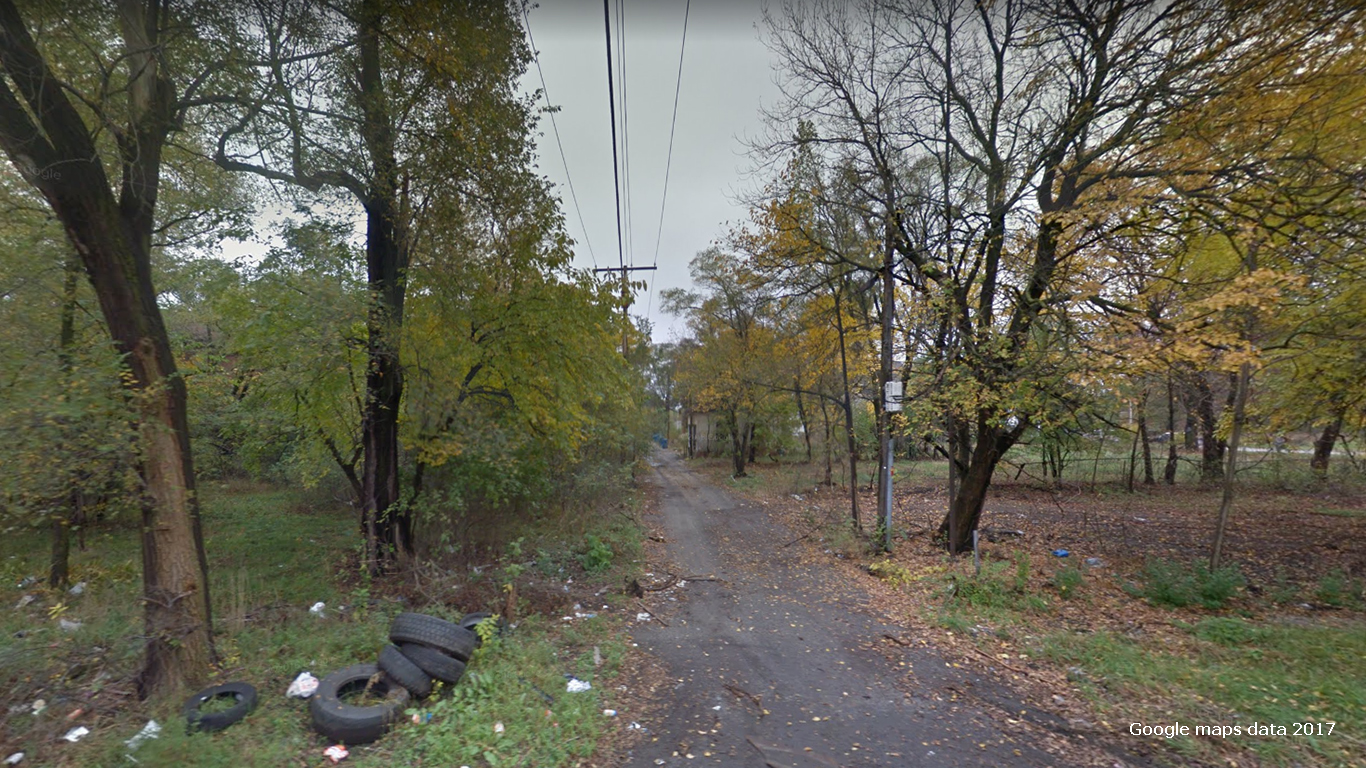
3. ZIP 46402 (Gary, Indiana)
> Vacant properties: 637 (29.5%)
> 5 yr. population change: -2.2%
> Population: 6,662
> Median home value: $54,500
Gary, Indiana was once a thriving steel town, home to the U.S. Steel Mill, the largest such plant in Northwest Indiana. Before cheaper foreign labor and automation changed the manufacturing industry, area steel mills employed as many 100,000 workers. Today, industry employment has declined by roughly 80%.
The 46402 ZIP code is one of three in Gary, Indiana where roughly 30% of all properties are vacant. Contained within the broader Chicago metro area, the ZIP code abuts the shore of Lake Michigan and is bisected by Interstate 90. Like many parts of the country with high vacancy rates, the 46402 ZIP code’s population is shrinking. In the last five years, the number of area residents declined by 2.2%.
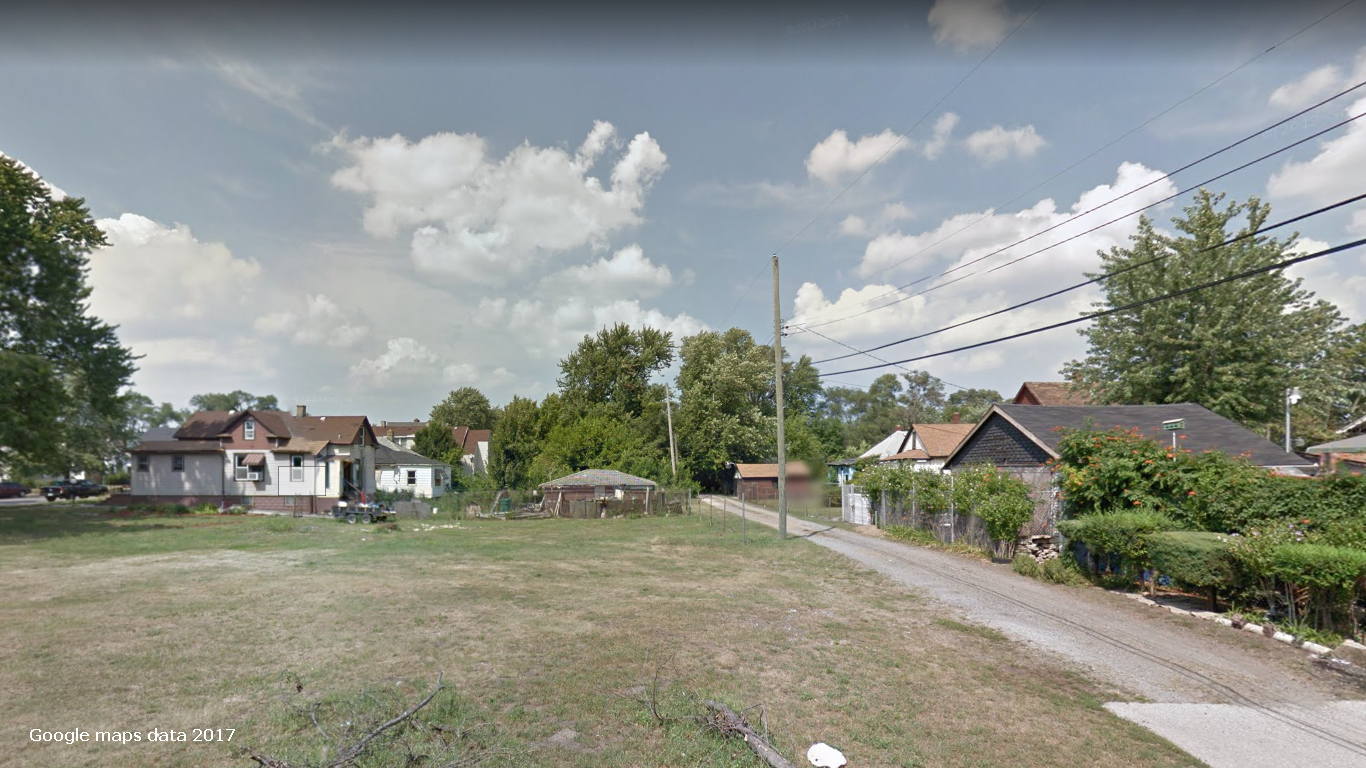
2. ZIP 46407 (Gary, Indiana)
> Vacant properties: 1,421 (29.6%)
> 5 yr. population change: -13.0%
> Population: 12,071
> Median home value: $56,100
All three neighborhoods with the nation’s highest vacancy rates are in Lake County, south of Chicago. All three are concentrated in Gary and report declining populations and low median home values. The population in ZIP 46407 declined by 13% over the last five years to 12,071, and the median home is worth $56,100. For reference, the average ZIP code population grew over that period, and the national median home value is $178,600.
Approximately 75% of unoccupied homes across the country are investment properties. In the neighborhoods with the highest vacancy rates, this percentage tends to be even higher, likely because the economic malaise plaguing many of these neighborhoods is at the same time an opportunity for investors. In ZIP 46407, by contrast, the percentage of vacant properties owned by investors is an exceptionally low 64.0%. This is likely reflective of the area’s especially poor economic conditions — so poor that many investors do not see an opportunity.
[in-text-ad-2]
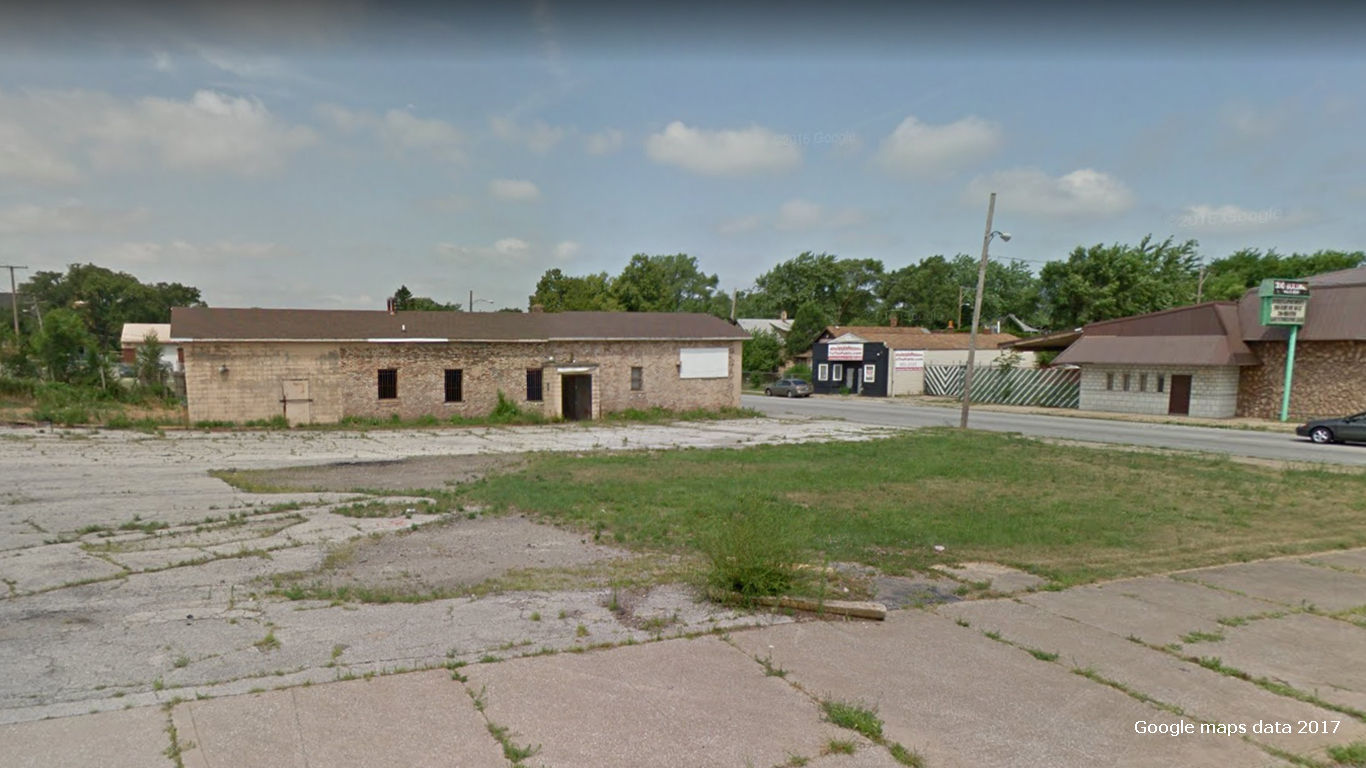
1. ZIP 46409 (Gary, Indiana)
> Vacant properties: 1,208 (30.3%)
> 5 yr. population change: -16.2%
> Population: 8,168
> Median home value: $60,500
Close to 1 in every 3 properties in ZIP 46409 are unoccupied, the highest vacancy rate of any neighborhood in the nation. The Chicago-Naperville-Elgin metropolitan area economy — where many neighborhood residents might search for employment — has recovered considerably from the Great Recession. But the metro’s September unemployment rate of 5.1% remains above the national jobless rate. Whether it is a jobs issue or any number of other factors, residents of ZIP 46409 are leaving in droves. Over the last five years, the neighborhood’s population declined by 16.2%. As is the case in most ZIPs on this list, home values are low in the area. The median home is worth $60,500, versus the national median home value of $178,600.
Detailed Findings & Methodology
As Blomquist noted, to reach vacancy rates of 20% to 30%, an area usually needs to have endured long periods of poor economic conditions, that lead to population decline.
The populations of all but five of the 30 neighborhoods on this list declined in the last five years. Reflecting the low demand for residential homes, home values in all but five of the ZIP codes fall well below the national median of $178,600. In fact, in 24 of the 30 areas the median home is worth less than half the national figure.
Economic struggles are nothing new for many of these areas. “Many of them tend to be in the Rust Belt, in states that were already experiencing an economic malaise when the Great Recession hit and have not been able to get back on their feet since,” Blomquist said.
With respect to the population decline common among these ZIPs, Blomquist added, “In some cases this could have been exacerbated by flight to the suburbs by homeowners chasing higher quality schools and lower crime rates.”
The violent crime rate of the metro areas containing 25 of the 30 neighborhoods exceeds the national rate of 386 per 100,000 people.
In many cases, the conditions pushing long-time residents to relocate are the same conditions investors see as opportunities. Just over 75% of unoccupied homes across the country are investor properties. The percentage of investor-owned vacant homes exceeds the national share in 22 of the 30 ZIP codes.
To identify the 30 towns with the highest vacancy rates, 24/7 Wall St. reviewed the percentage of residential properties flagged as vacant by postal carriers in 26,864 ZIP codes provided by Attom Data Solutions as of the end of the third quarter of 2017. Foreclosure rates, the percentage of vacant properties with open loans, in foreclosure, and bank owned were also provided by Attom Data Solutions.
Social and economic data, including population estimates, poverty rates, median household income, and median home values are five-year averages through 2015 from the U.S. Census Bureau’s American Community Survey (ACS). Population and home value changes were calculated using five-year averages through 2015. These are the latest and most accurate data for the zip codes reviewed.
Get Ready To Retire (Sponsored)
Start by taking a quick retirement quiz from SmartAsset that will match you with up to 3 financial advisors that serve your area and beyond in 5 minutes, or less.
Each advisor has been vetted by SmartAsset and is held to a fiduciary standard to act in your best interests.
Here’s how it works:
1. Answer SmartAsset advisor match quiz
2. Review your pre-screened matches at your leisure. Check out the advisors’ profiles.
3. Speak with advisors at no cost to you. Have an introductory call on the phone or introduction in person and choose whom to work with in the future
Have questions about retirement or personal finance? Email us at [email protected]!
By emailing your questions to 24/7 Wall St., you agree to have them published anonymously on a673b.bigscoots-temp.com.
By submitting your story, you understand and agree that we may use your story, or versions of it, in all media and platforms, including via third parties.
Thank you for reading! Have some feedback for us?
Contact the 24/7 Wall St. editorial team.
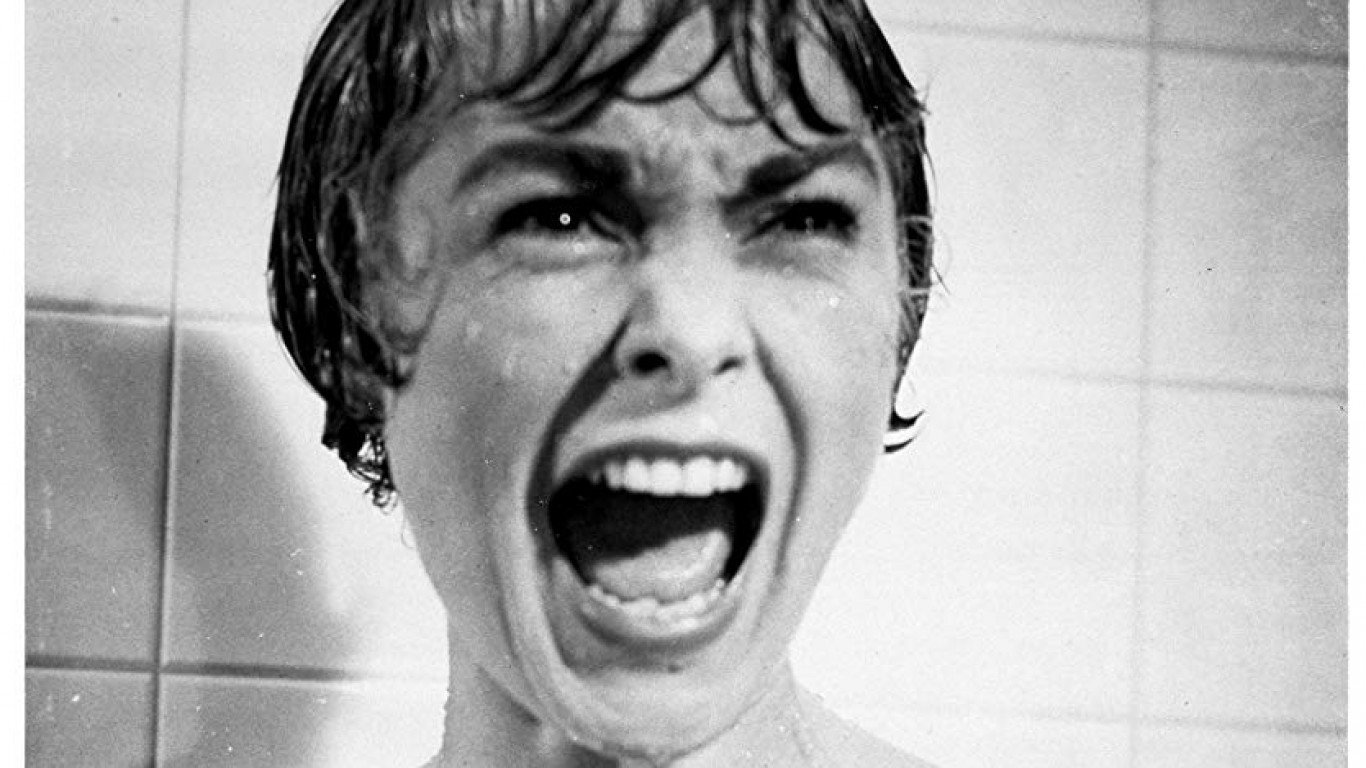 24/7 Wall St.
24/7 Wall St. 24/7 Wall St.
24/7 Wall St. 24/7 Wall St.
24/7 Wall St. 24/7 Wall St.
24/7 Wall St.


